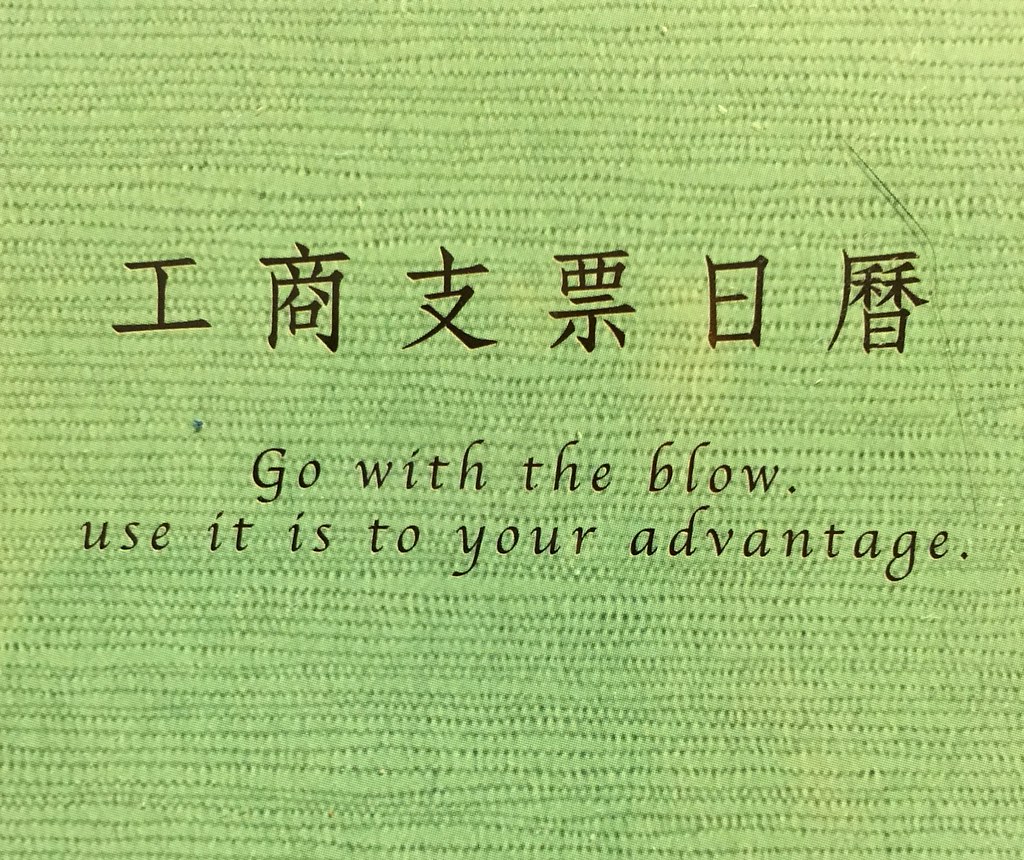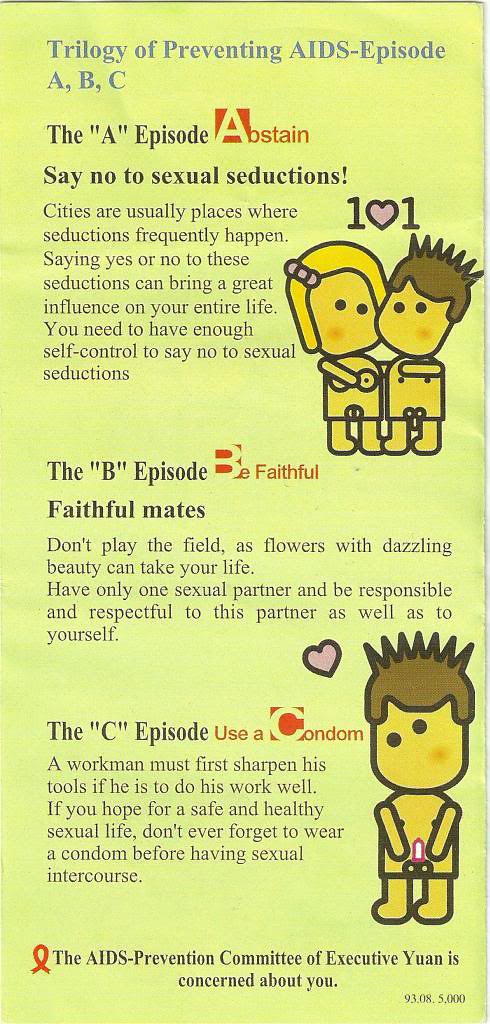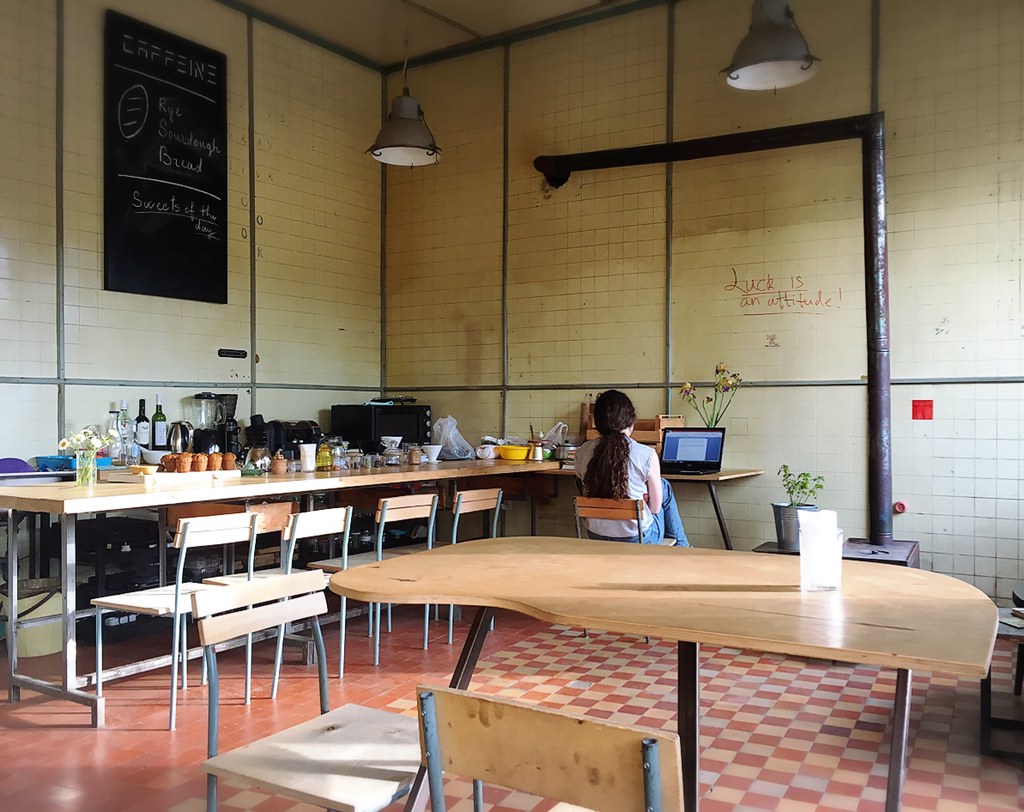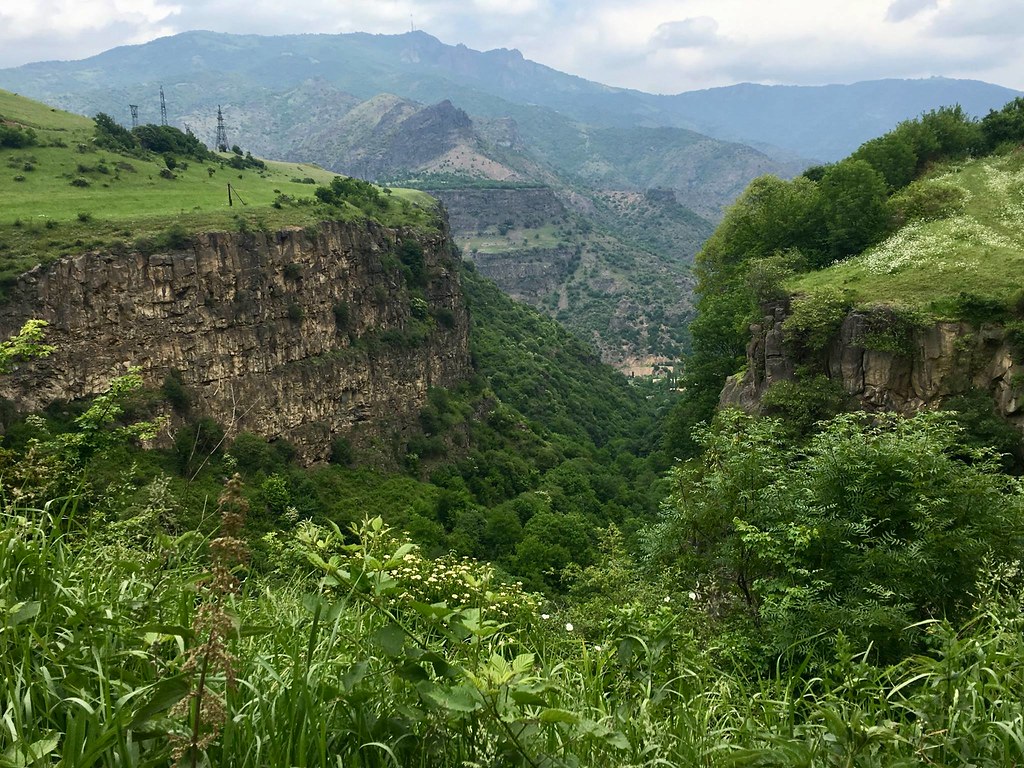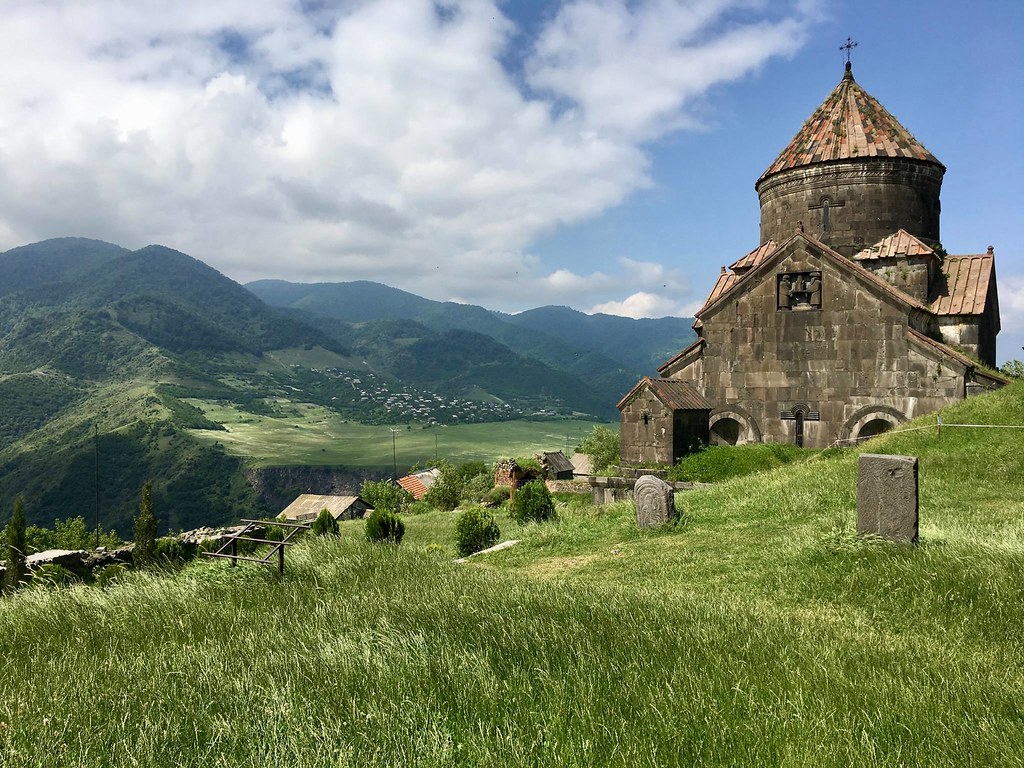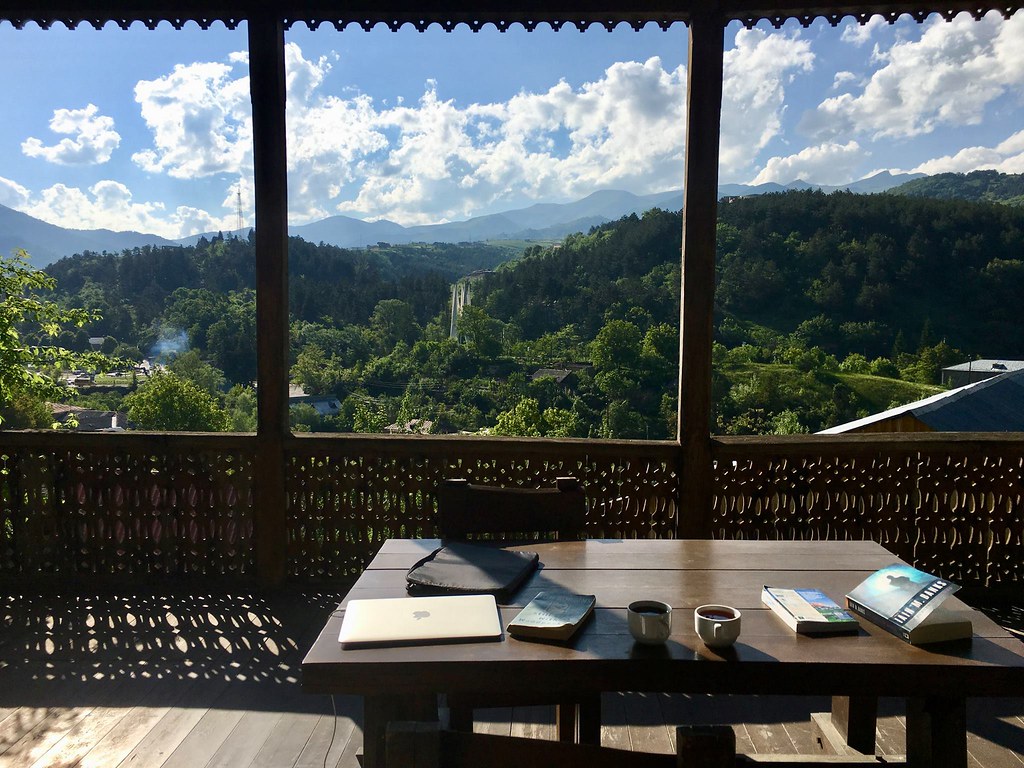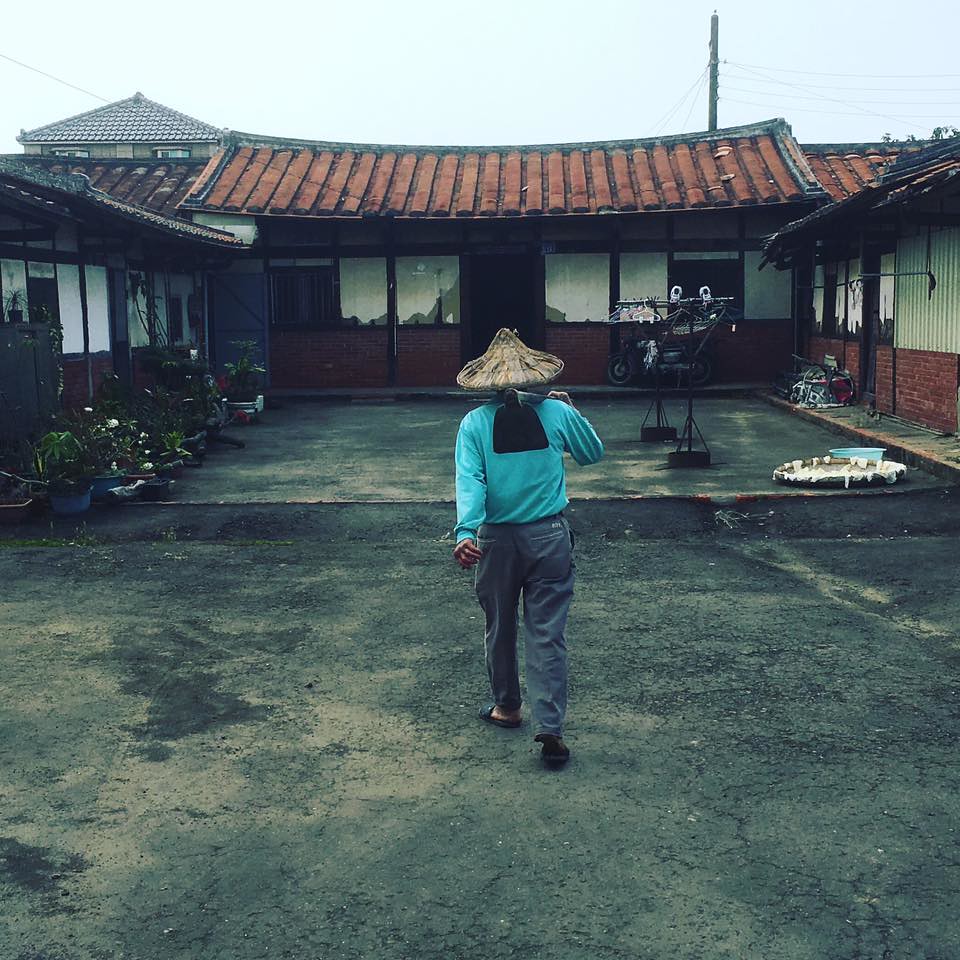 |
| On the outskirts of Jingliao (菁寮) near the Chiayi border |
This post has been a long time coming - I took this trip in the early summer of 2017, the last of several successive visits to Tainan between March 2016 and April 2017.
In fact I remember exactly which day we left, because it was the day that the Sunflowers put on trial were acquitted, a happy outcome that I learned about on the HSR south.
Why Tainan? Well, I just happen to really like the place. If they had better public transport - and I had a good job offer - I'd live there. Some of these trips - I think I went four times in total - were for fun. Twice, I got sent there for work for two completely unrelated reasons (my love of Tainan is so well-known that even my various employers are aware of it, so I have something like first dibs on any work in that city). Once, I took my visiting cousin down so he could see more of the country.
This time, a friend of ours had wanted to explore not Tainan City but Tainan County (which is now like greater Tainan City, they've incorporated the whole thing, but that's stupid and I still differentiate). Unfortunately, the lack of good public transport means if you want to do that, you pretty much have to drive. Other options if driving is not possible include hiring taxis to get you from one town to the other - possible if you pre-arrange it - or doing day trips from Tainan City. Neither of these are as fun as driving yourself.
I know what you're thinking - if there's one thing we know about Jenna, it's that she hates driving and is quite happy to tell you so, repeatedly! And you're kind of right. I do hate driving...in cities. In the open country it can actually be quite nice. I actually do have a license and international driver's permit, because once I'm out of the city I'm not at all opposed to renting a car.
That said, although this trip was meant to be just about Tainan's rural stretches, I can never resist a day in the city - I managed to convince our friend to leave a day early and just chill downtown because who doesn't love that?
We ate a hell of a lot of food, including braised meat rice (picture below), eel noodles, milkfish congee with fried pastry stick, glutinous meat balls with wasabi, 碗粿 (a glutinous bowl of tasty stuff topped with gravy and egg - I'll find the address later but it's super famous), my favorite melon with ice cream, and beef soup (there are many good places to have this - try this one).
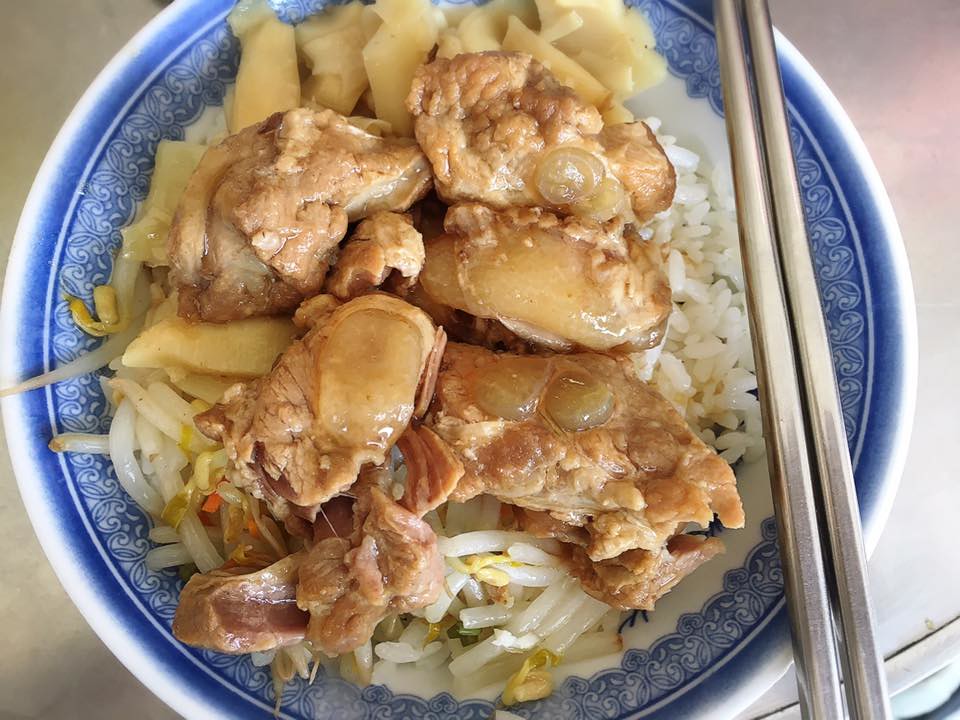
Otherwise, we just chilled in the city - lots of temples, cafes, atmospheric streets and old buildings to hang out in. What else does one do in Tainan with a free day?
And you know what else I love about Tainan City - other than everything except the crap public transport? That you are definitely in a city, but it's hard to tell sometimes with all the atmospheric backstreets.
So, before we hit the road, enjoy some pictures:
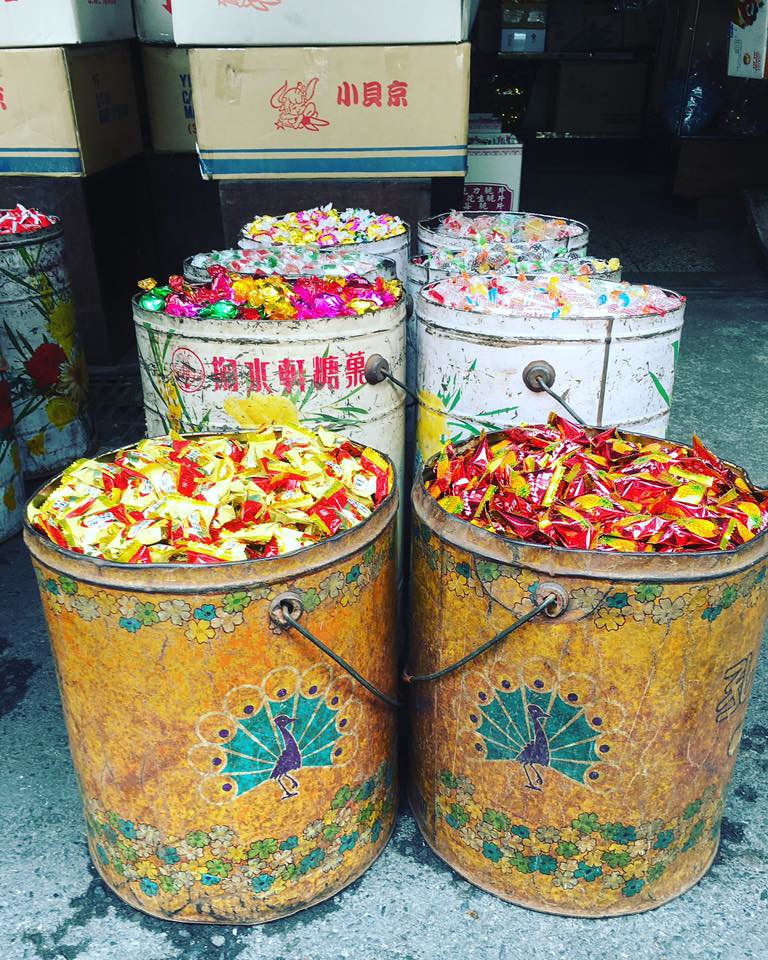
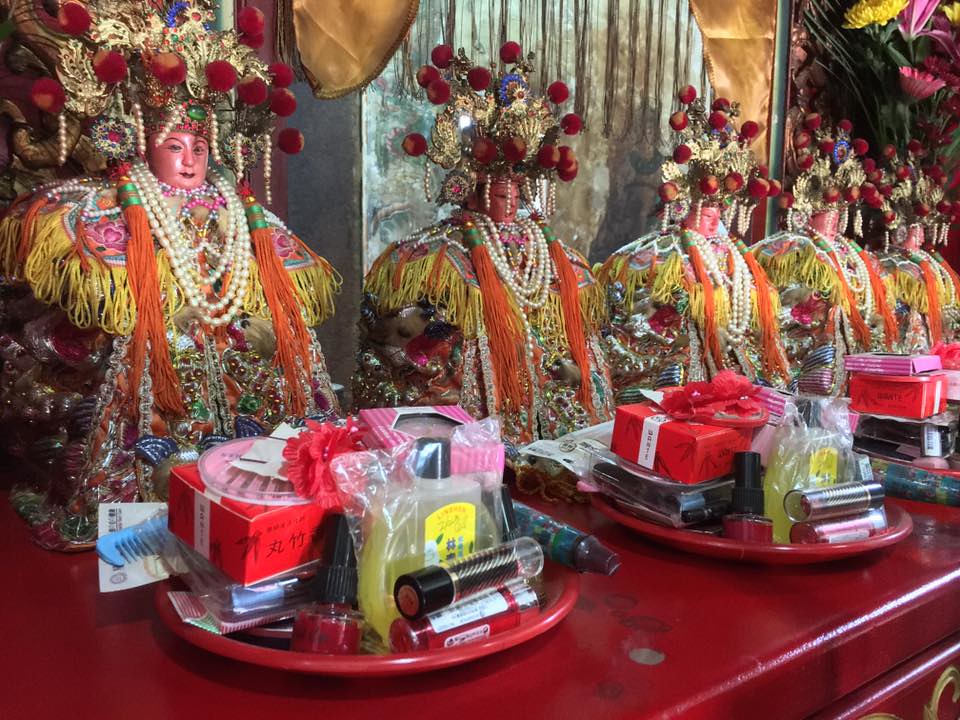 |
| The Five Concubines Temple - with feminine offerings for the five hanged ladies |
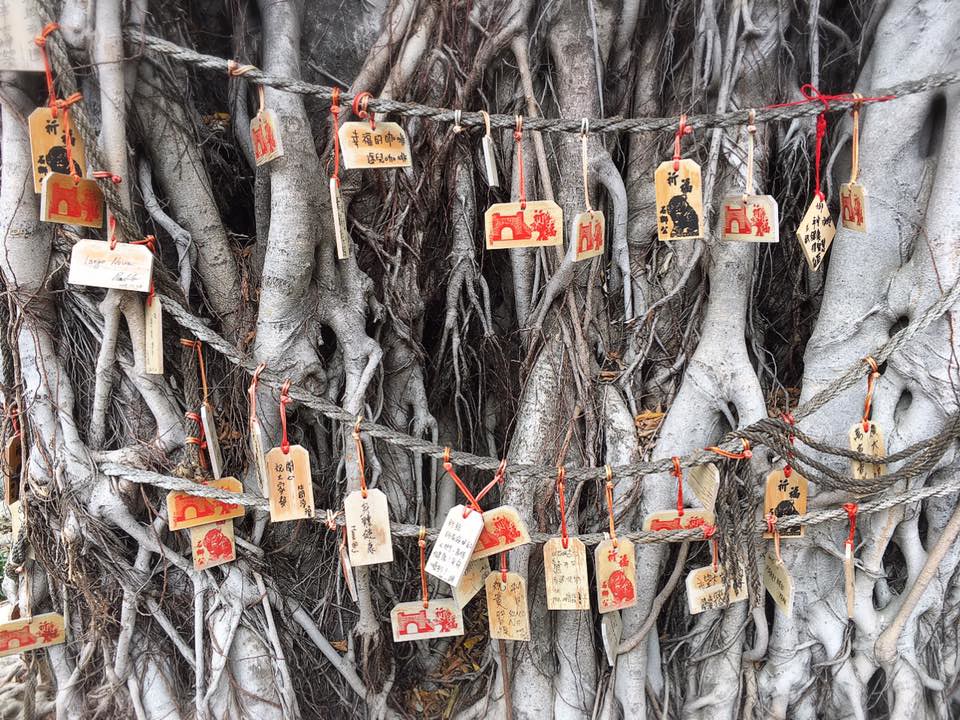
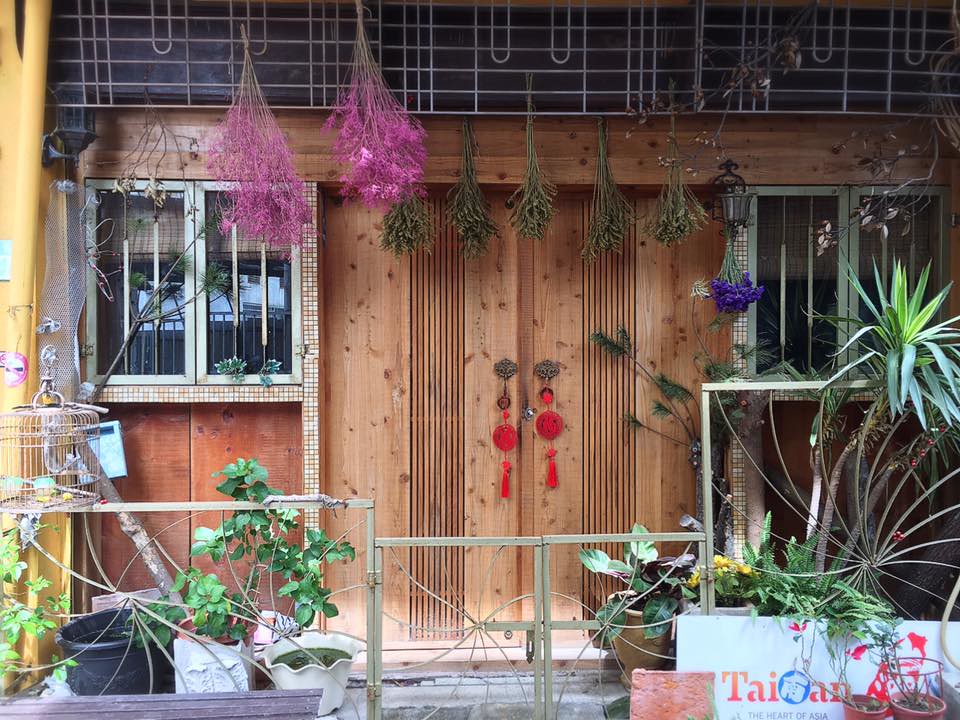
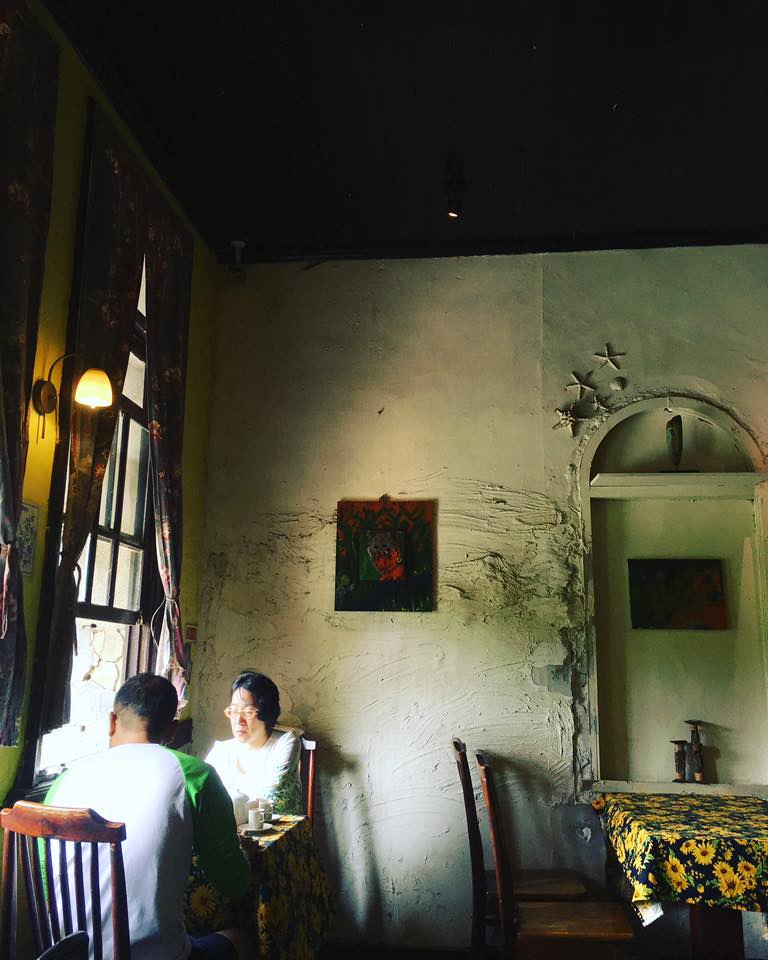 |
| At Narrow Door Cafe (窄門咖啡) |
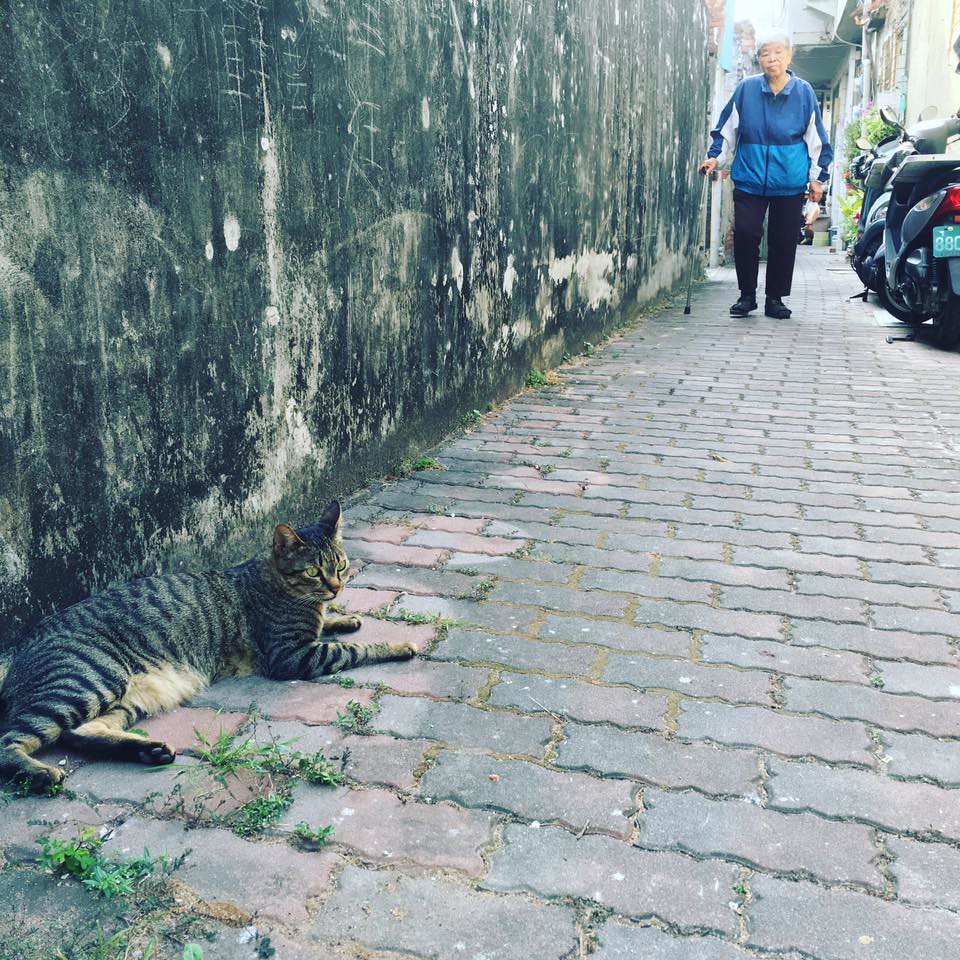
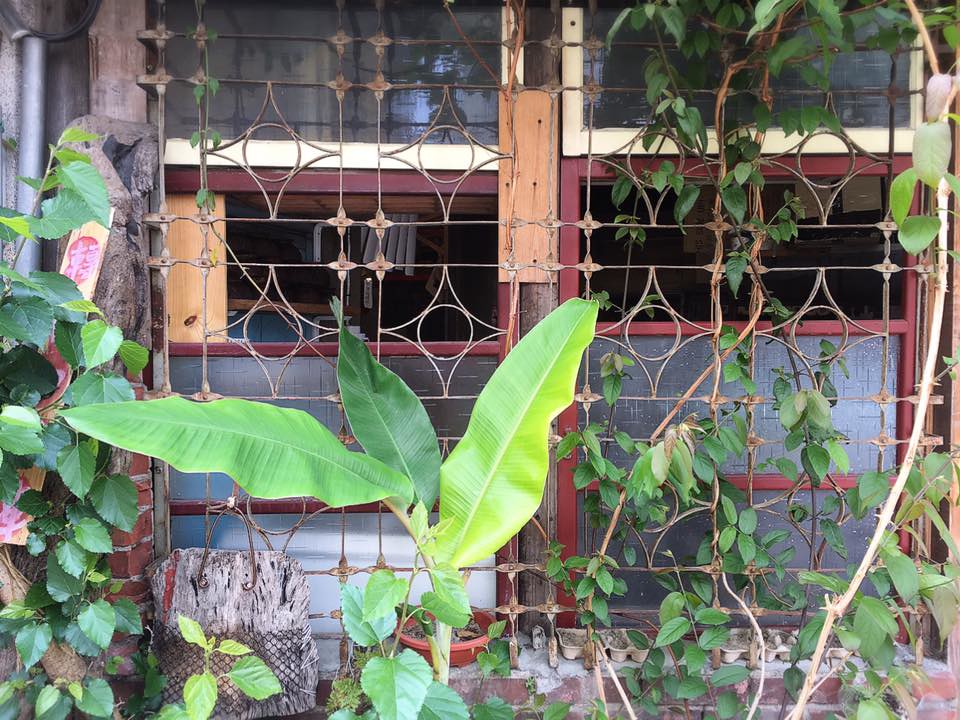
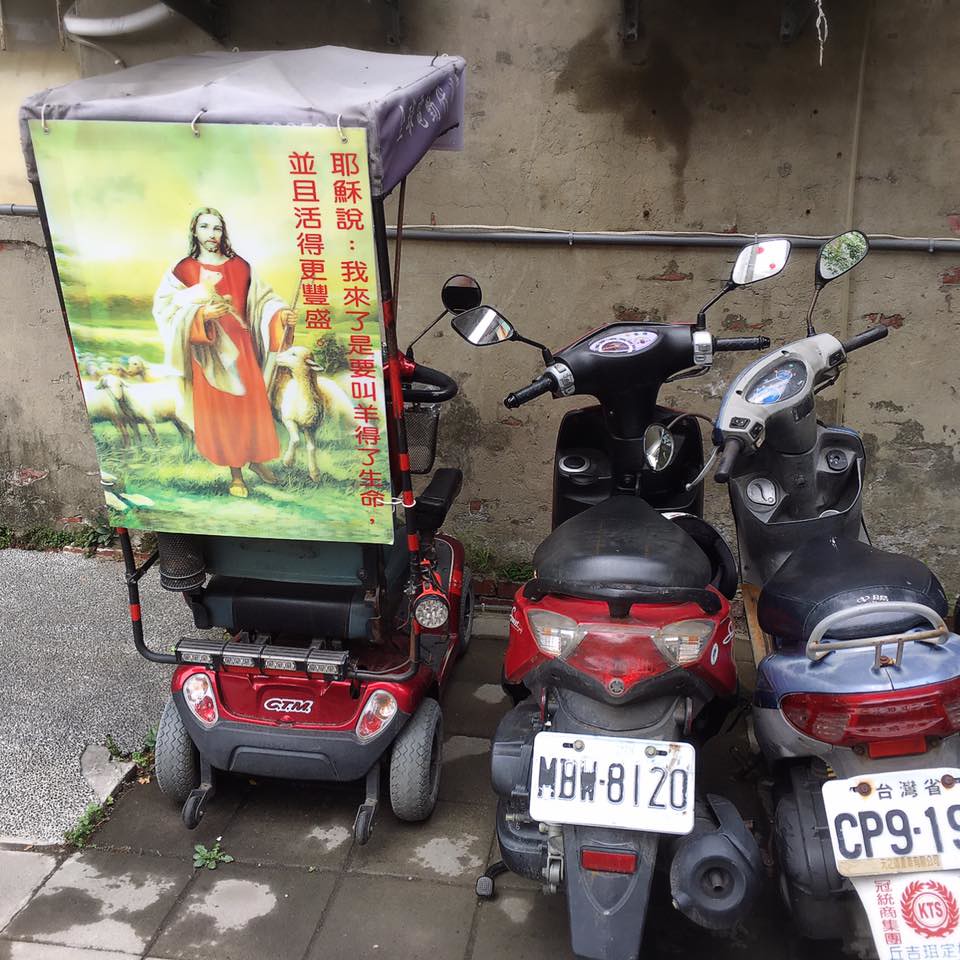 |
| it's the Jesus-mobile! |
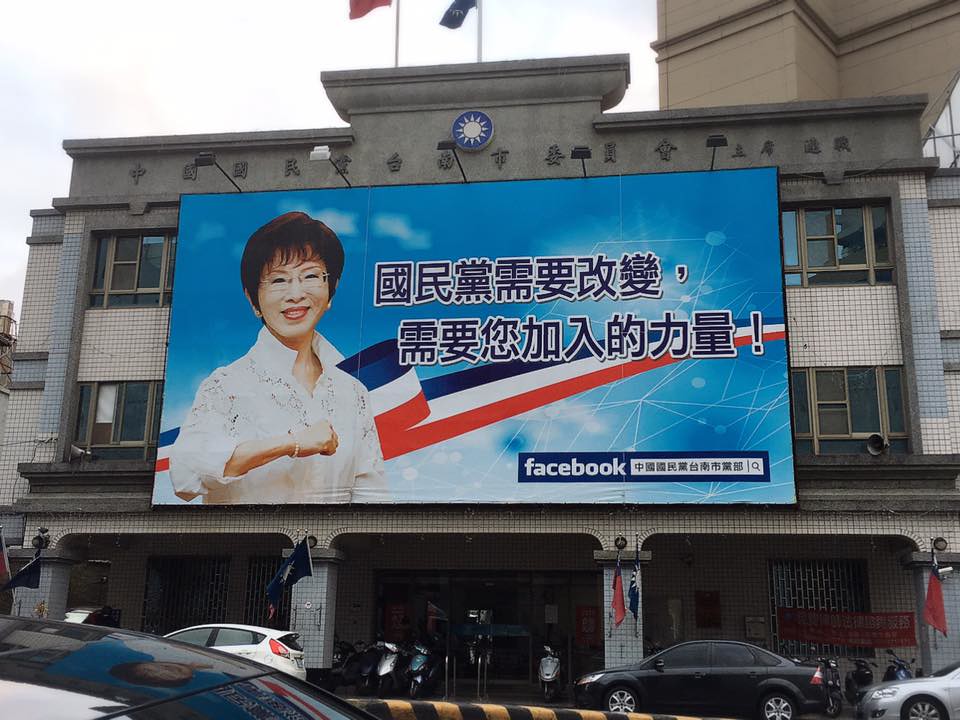 |
| This says "the KMT needs to change...we need you to join and give us power!" (or something like that). Ha. I mean that the KMT campaigns in Tainan at all is a joke, but... |
The next day, we headed back to the HSR to pick up a rental car. We weren't quite done with Tainan City yet, though - I'd wanted to go to the National Museum of Taiwan History for some time. It's near Tainan City, but not that easy to get to by public transit, so we decided to pick up the car first and drive.
Just outside is a huge map of Taiwan, in a satellite style, but imagined as it would have looked in prehistoric times (this has a filter on it which is why it looks odd):
Just outside is a huge map of Taiwan, in a satellite style, but imagined as it would have looked in prehistoric times (this has a filter on it which is why it looks odd):
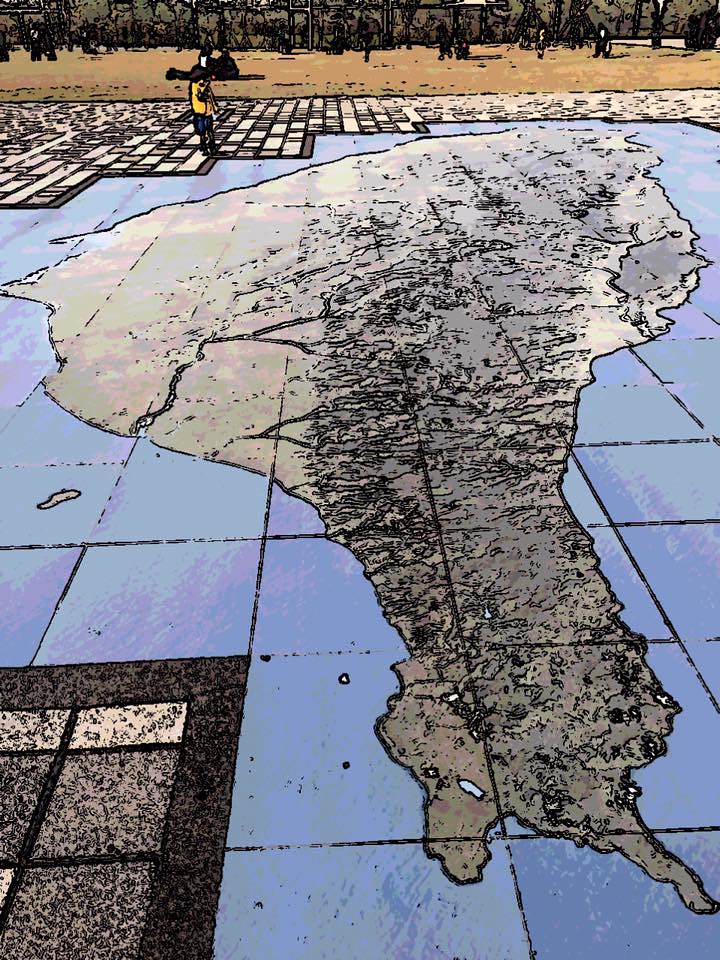
I noted with mixed emotion the very first placard you see when you walk in:
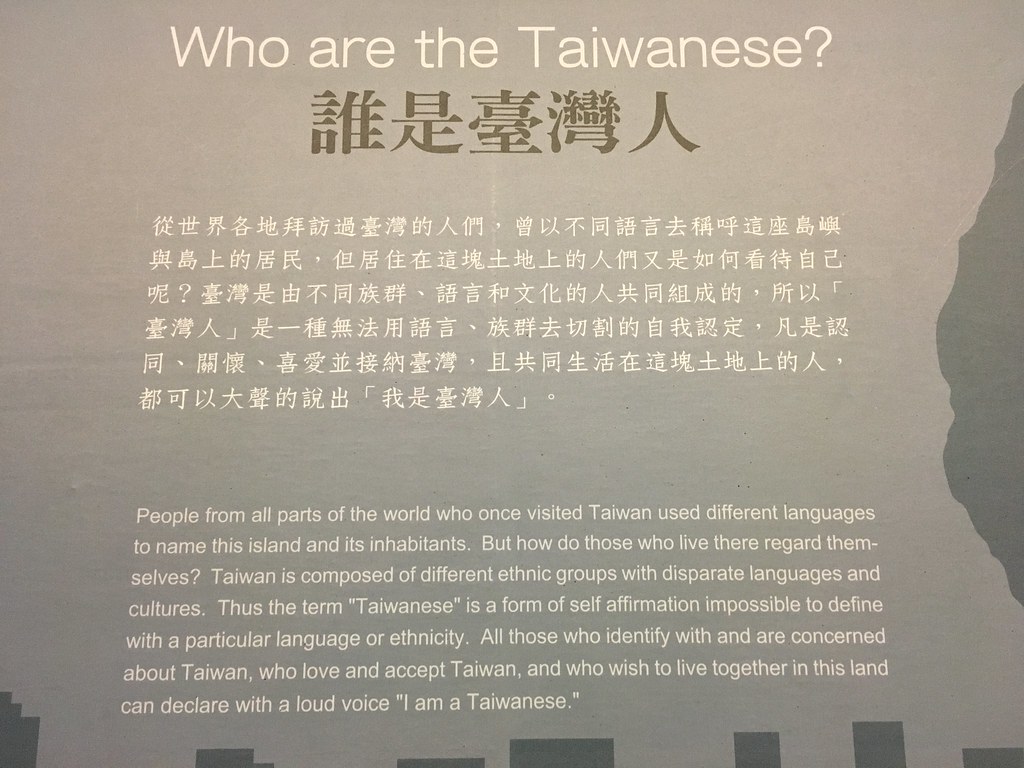 |
| Would someone please send a copy of this to the government? |
...because this is a lovely sentiment, but so far removed from the reality of Taiwan's immigration laws that it makes me want to cry.
I mean, I would love to declare with a loud voice that "I am a Taiwanese", but that's so far from being mainstream accepted - and let's face it, I do come from a wildly different cultural background on the other side of the world, living in a country that has only recently started to consider its own diverse history. Taiwan is not a monoculture, but not everyone's figured that out yet. A friend once pointed out that if we feel that those who came from China in the 1940s would be well-advised to consider themselves "Taiwanese" rather than telling the Taiwanese that they are Chinese (which the Taiwanese are, for the record, not particularly interested in hearing), then we can't ourselves turn around and say that we as permanent residents of Taiwan are "not" Taiwanese.
And yet, I don't know whose land this is, but it doesn't really feel like mine yet. Not because I don't want it to, but because others don't necessarily want it to, or haven't even realized that it's a possibility yet.
The museum itself is great - it's structured more along the lines of learning about history through imagery than showing actual artifacts - all, or almost all, of the artifacts on display are high-quality reproductions. But, for that it was still interesting.
We stayed until the museum closed, and then drove to Xinhua, not far from Tainan City, arriving just before dark.
We stayed at 老街168民宿 - a hotel just across the street from the park at the end of the old street (you'll know it because it's the one with the Japanese-era martial arts hall to one side). There's not much to do in Xinhua after dark, but we entertained ourselves - Xinhua is famous for its goat meat, so we went to a restaurant recommended by our hotel. There are a few such restaurants near the Zhongxing Rd. and Fuxing Rd. intersection not far away (I can't remember which one we ate at exactly).
Then we wandered a bit, not finding a night market or anything like that but coming across a fairly normal old temple, that is, except for these terrifying decorations:
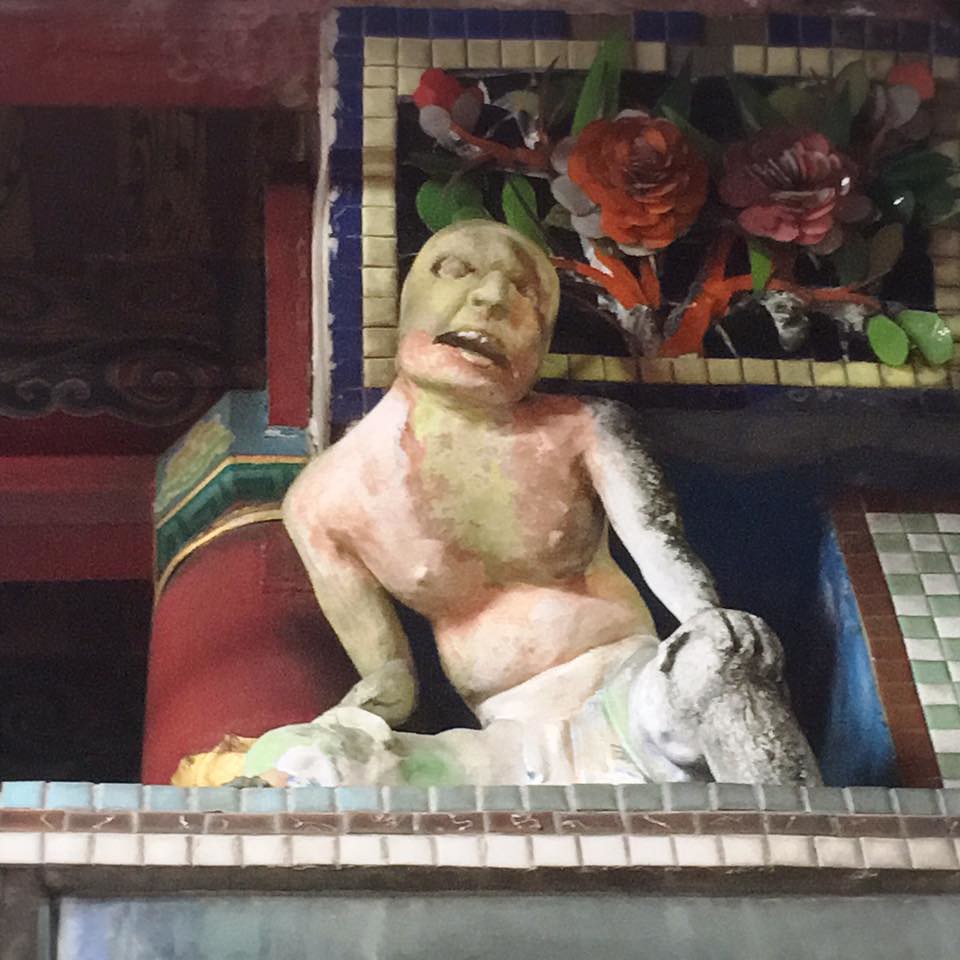
If you take the old street (Heping Street) to Zhongzheng Road and turn left, you'll pass it eventually.
Xinhua has a very pretty old street that is - as yet - undeveloped. Other than a single coffee shop, there isn't much to do other than look at the lovely Japanese-era buildings, although some of the lanes are very atmospheric.
There's also an old-school market:
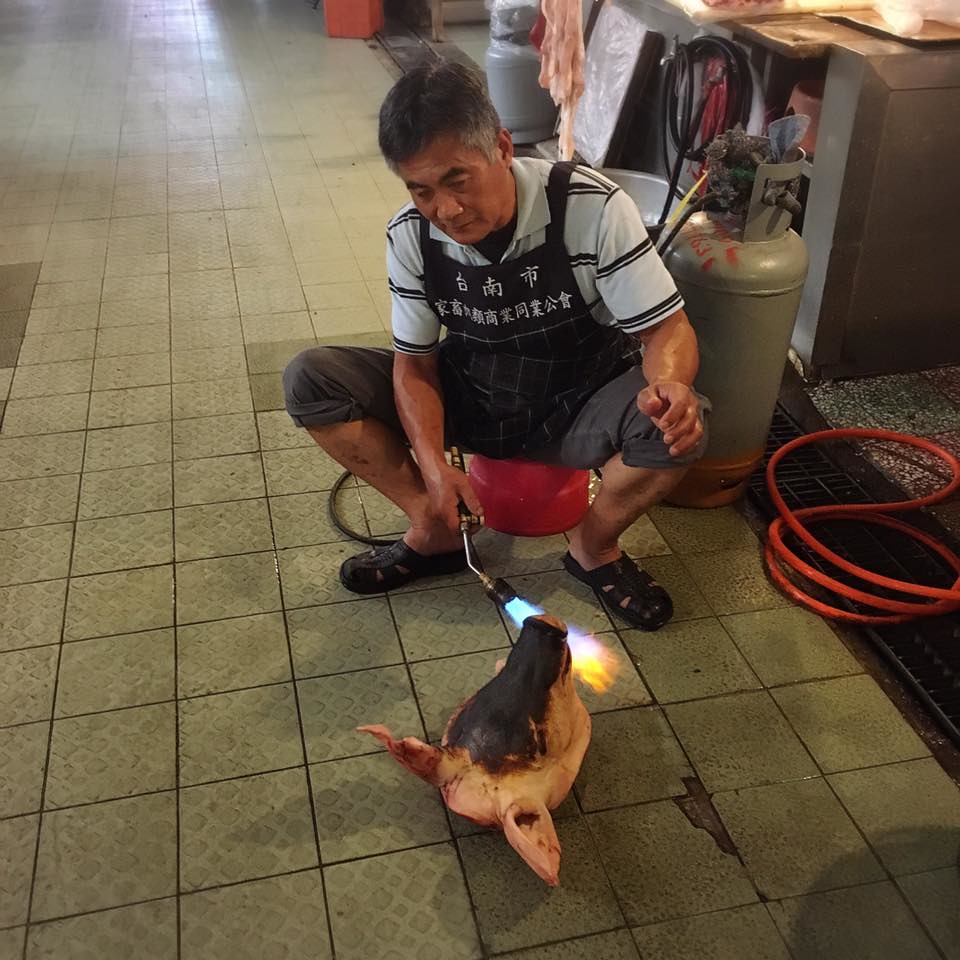
Some pretty Xinhua old street houses (filtered because the flat white sky wasn't very appealing):
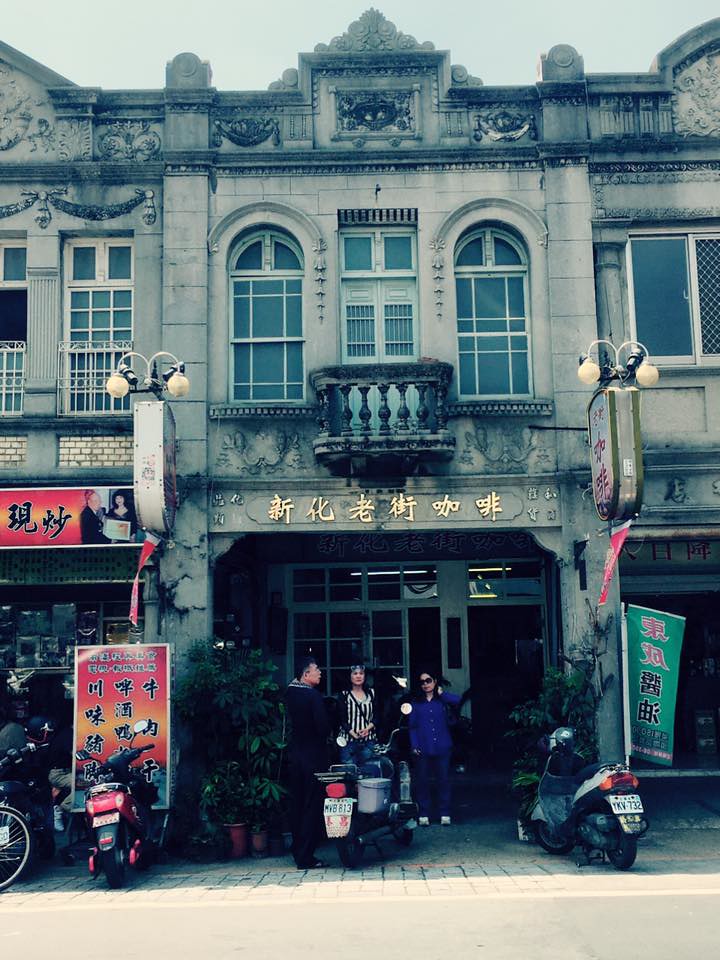
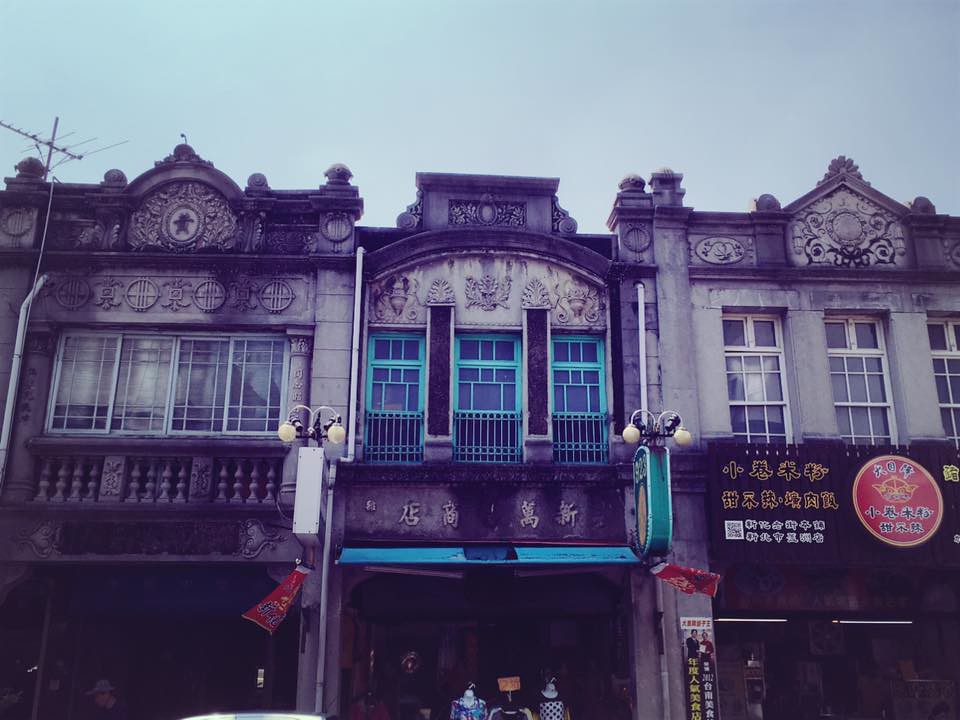
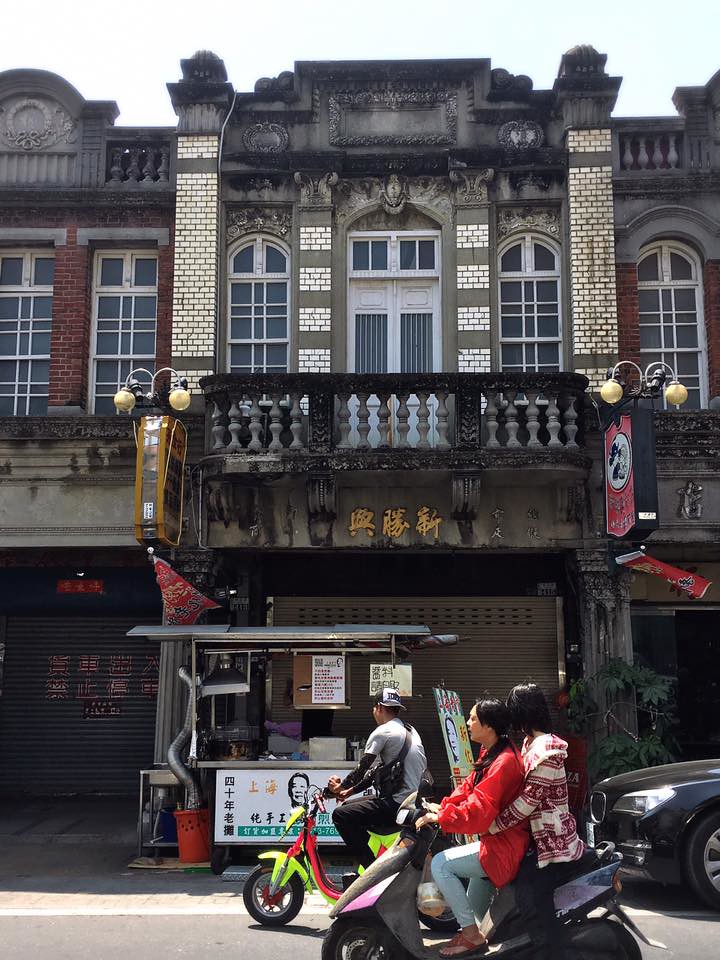
Lanes and backstreets - worth walking down:
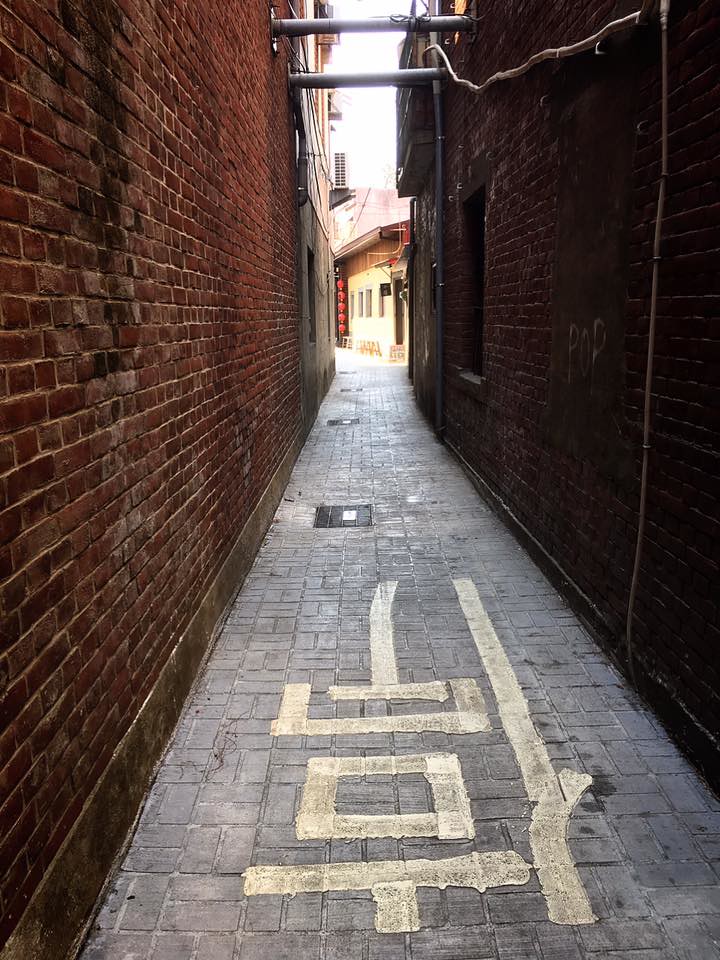
I'm telling you that market was great - meat + underpants!
I mean, I would love to declare with a loud voice that "I am a Taiwanese", but that's so far from being mainstream accepted - and let's face it, I do come from a wildly different cultural background on the other side of the world, living in a country that has only recently started to consider its own diverse history. Taiwan is not a monoculture, but not everyone's figured that out yet. A friend once pointed out that if we feel that those who came from China in the 1940s would be well-advised to consider themselves "Taiwanese" rather than telling the Taiwanese that they are Chinese (which the Taiwanese are, for the record, not particularly interested in hearing), then we can't ourselves turn around and say that we as permanent residents of Taiwan are "not" Taiwanese.
And yet, I don't know whose land this is, but it doesn't really feel like mine yet. Not because I don't want it to, but because others don't necessarily want it to, or haven't even realized that it's a possibility yet.
The museum itself is great - it's structured more along the lines of learning about history through imagery than showing actual artifacts - all, or almost all, of the artifacts on display are high-quality reproductions. But, for that it was still interesting.
We stayed until the museum closed, and then drove to Xinhua, not far from Tainan City, arriving just before dark.
We stayed at 老街168民宿 - a hotel just across the street from the park at the end of the old street (you'll know it because it's the one with the Japanese-era martial arts hall to one side). There's not much to do in Xinhua after dark, but we entertained ourselves - Xinhua is famous for its goat meat, so we went to a restaurant recommended by our hotel. There are a few such restaurants near the Zhongxing Rd. and Fuxing Rd. intersection not far away (I can't remember which one we ate at exactly).
Then we wandered a bit, not finding a night market or anything like that but coming across a fairly normal old temple, that is, except for these terrifying decorations:

If you take the old street (Heping Street) to Zhongzheng Road and turn left, you'll pass it eventually.
Xinhua has a very pretty old street that is - as yet - undeveloped. Other than a single coffee shop, there isn't much to do other than look at the lovely Japanese-era buildings, although some of the lanes are very atmospheric.
There's also an old-school market:

Some pretty Xinhua old street houses (filtered because the flat white sky wasn't very appealing):



Lanes and backstreets - worth walking down:

I'm telling you that market was great - meat + underpants!
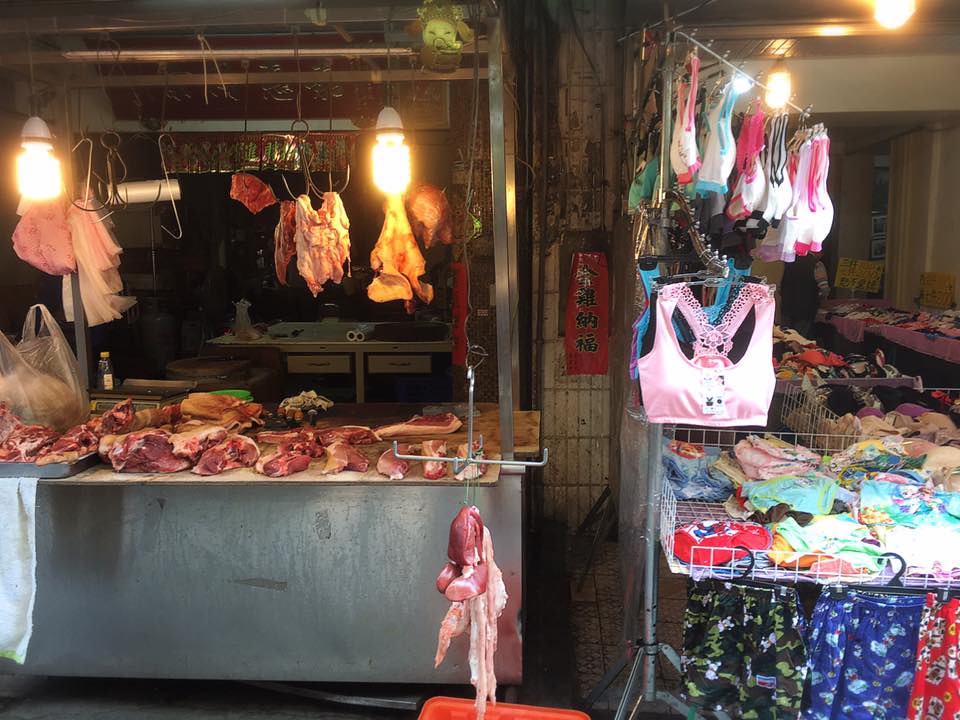
We wandered until we got bored, drank some coffee then walked a little bit more in town, finding this abandoned house:
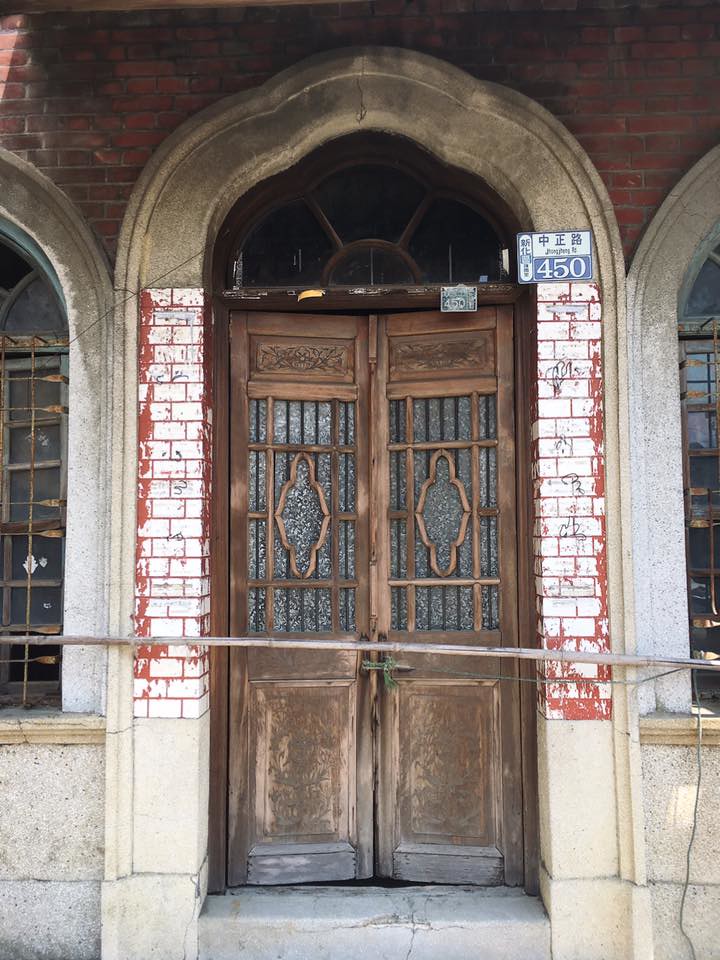
You can just about peek in the window:
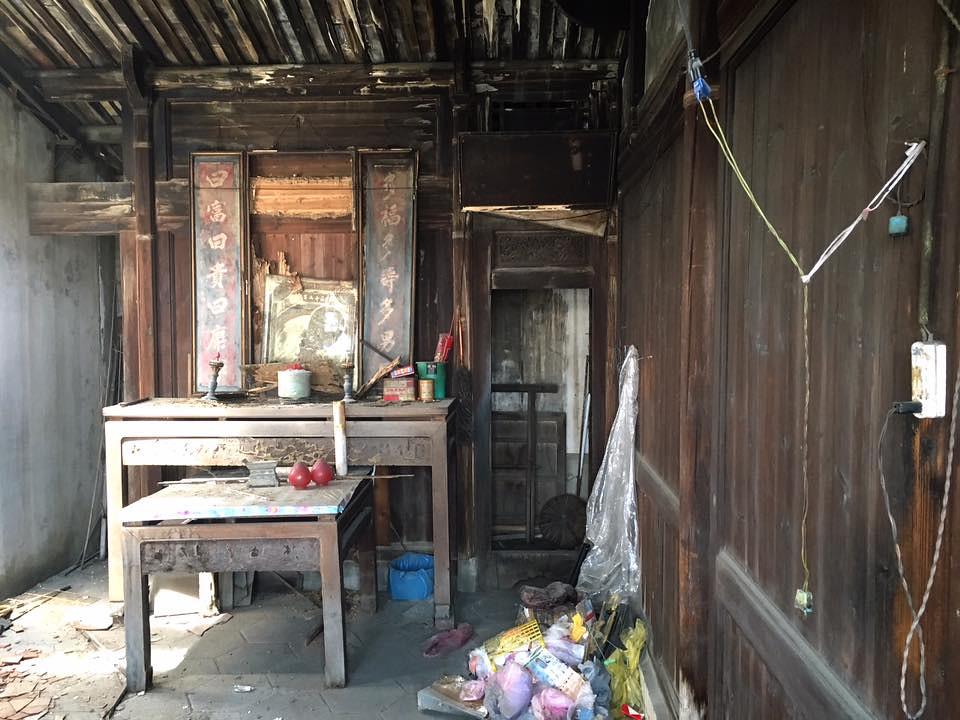
We're not Synapticism, so we didn't break in, but it was pretty cool.
That seemed to exhaust what Xinhua had to offer, so we hopped in the car and took off for Moon World.
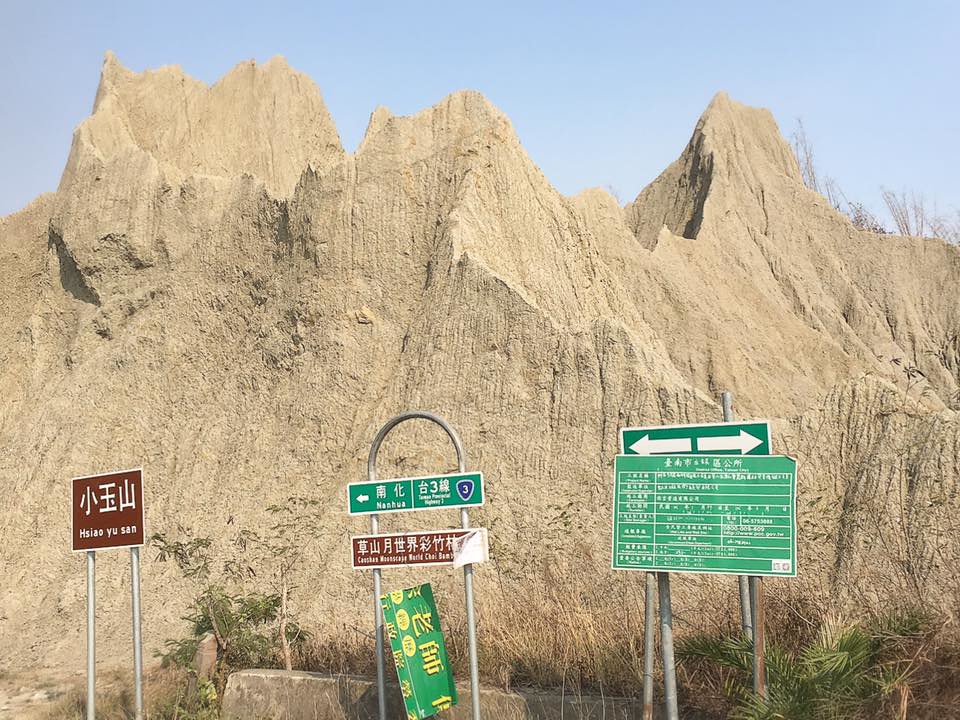
It sounds like a terrible theme park, but it's not - it's a large area of badlands on the Tainan/Kaohsiung border - eroded mudstone that looks like a lunar landscape.
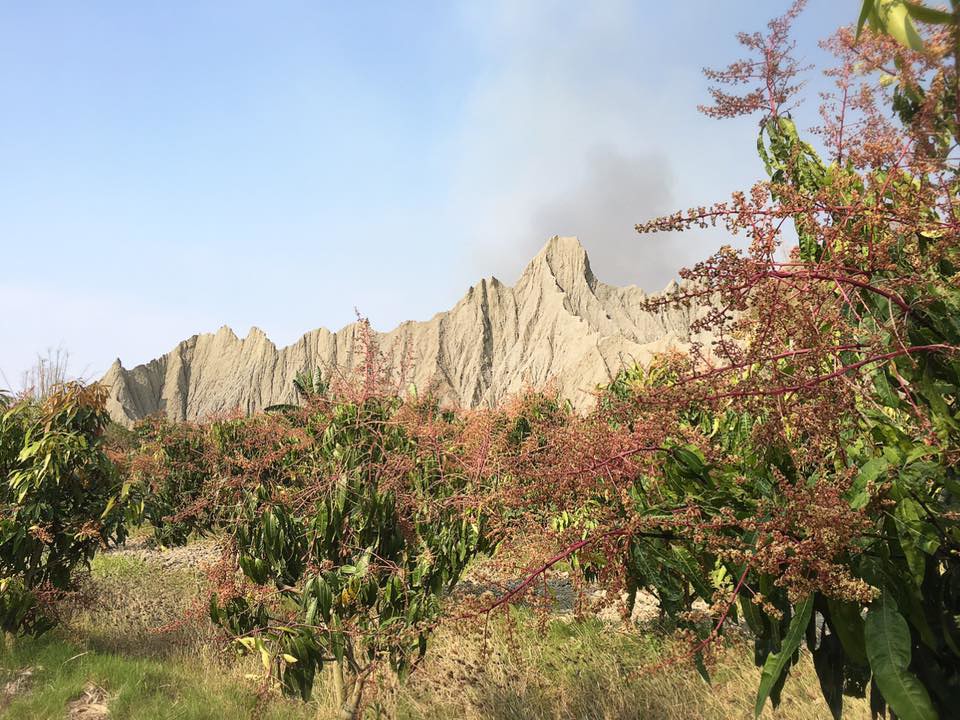
There is still some plant life, and a few people do live around here. The smoke you see in the photo above, though, is from some sort of draft pulling dust off of "Little Jade Mountain". And just in case you didn't believe me, see, here's proof. I can and do drive.
Just not in cities.
The roads around here are actually quite lovely to drive in, and I'm pretty good at hills and mountains - the best of the three of us, frankly. I don't mind this kind of jaunt in a car at all. The weather was so nice we kept the windows down and let the warm breeze flow in. No AC for us!
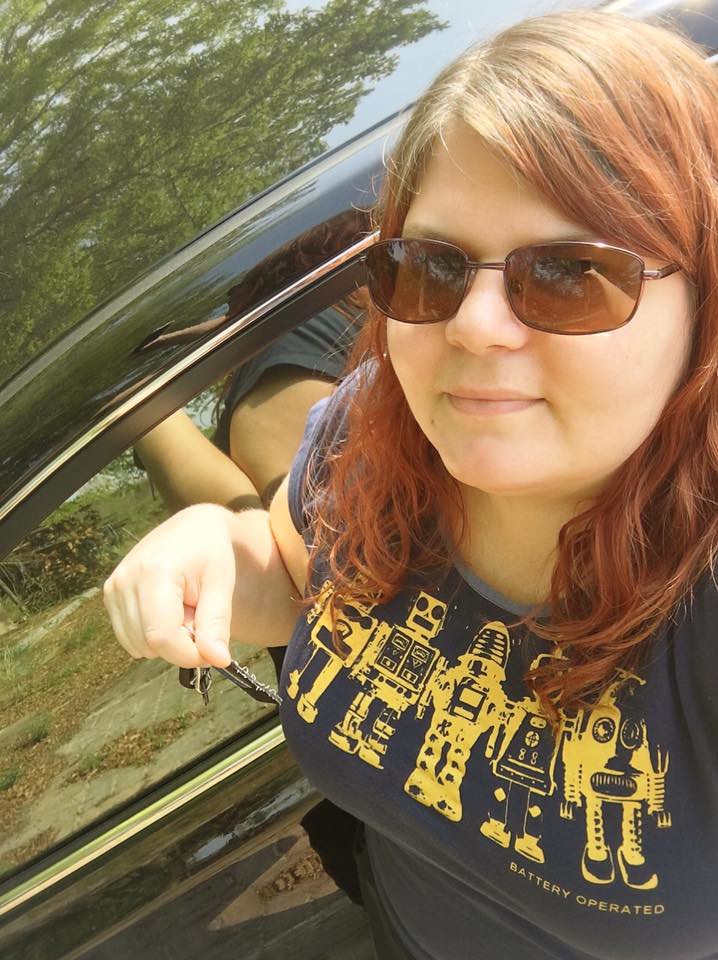
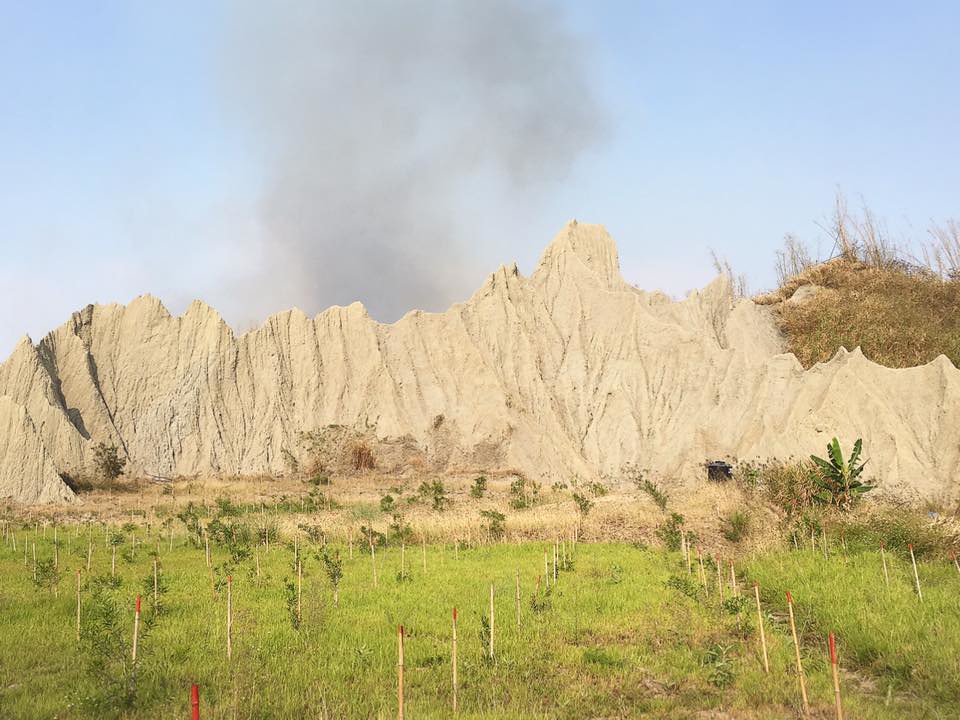
Since I was the driver, not the navigator, I don't actually remember the route we took but I believe we drove the南168 to the 南171, eventually turning off down a series of country roads - anything to avoid the highway, besides the scenery is better - to finally hit the 20. We stopped at some lovely lookouts - more than one, in fact:
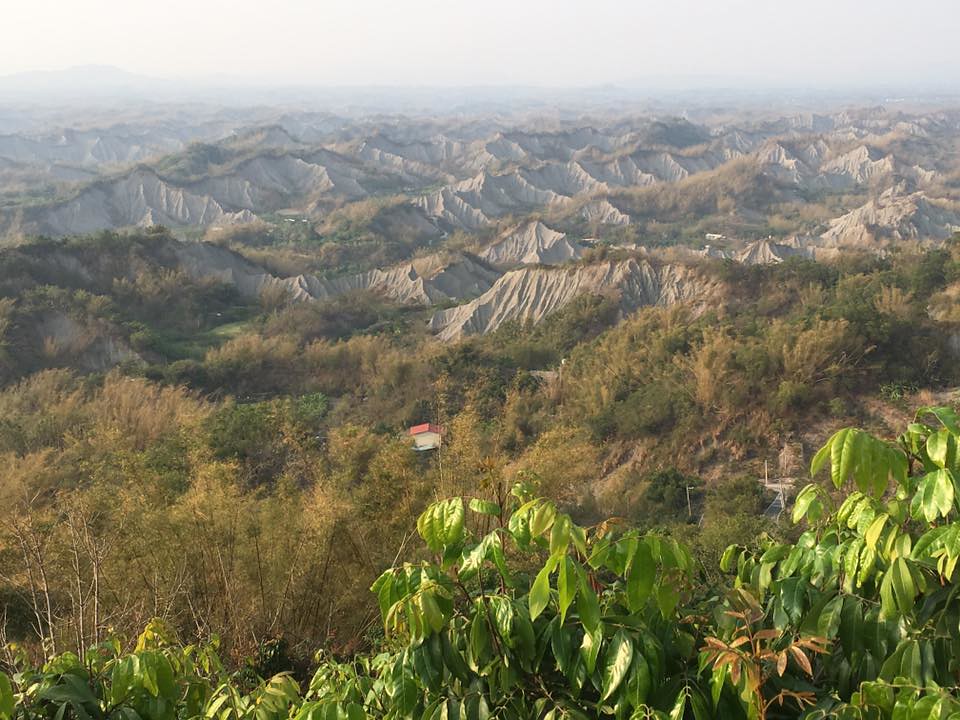
And otherwise took to the backcountry, the types of places that make you want to sing 黃昏故鄉 at the top of your lungs, if you speak Taiwanese, which I don't.
But I won't lie, I saw this landscape in the late afternoon and keyed it up - different arrangement though - on the driving playlist. Twice. Hey, don't judge. It's not my hometown, but I can still find it beautiful in the yellowing light. It's not my land, but I love it anyway.
We slowed down to enjoy the scenery with this playing and some local dude peeked in the car, saw three whiteys and got the shock of his life, and that was just great.
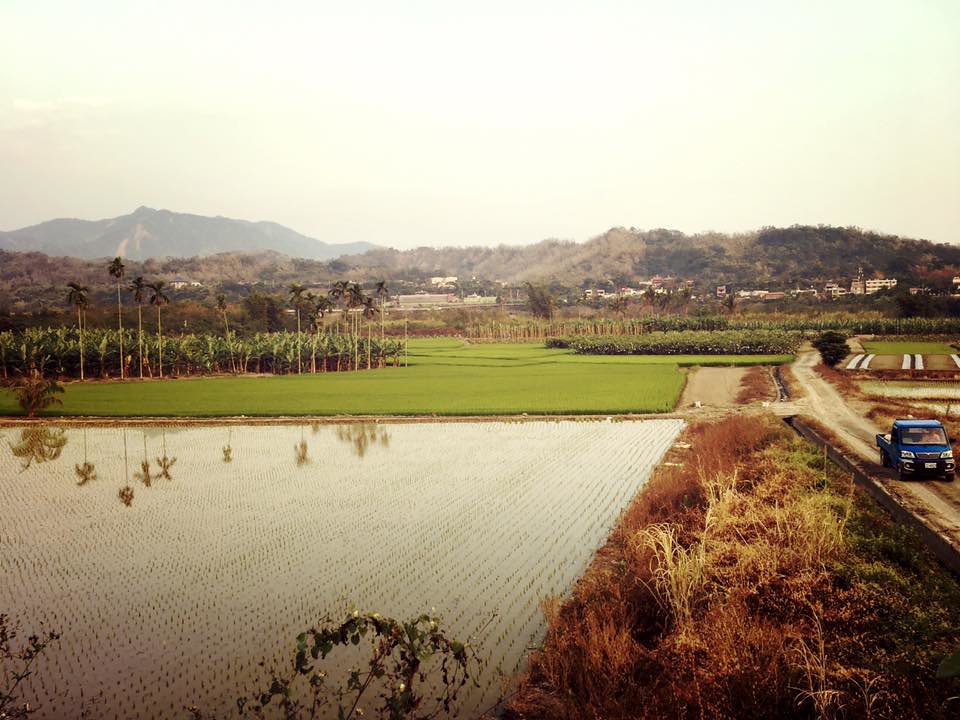
From there it was a gentle twilight drive over the Tainan-Kaohsiung border to our accommodation for the night in Jiaxian (甲仙), just across the way in Kaohsiung.
Jiaxian isn't anything special, but we had a good dinner (I can't find the restaurant on Google Maps) with preserved tofu fried chicken with sour plums (豆腐乳酸梅炸雞) and some other dishes, and as the area is famous for taro, some taro balls for dessert. Then some taro ice cream. The bridge into town is painted the color of taro, as well.
We stayed at Gooddays near the bridge - yes, they have a Jiaxian store - and I picked up a few gifts in their gift shop downstairs.
But there's not a lot else to do in Jiaxian, so this is the only photo I took worth sharing:
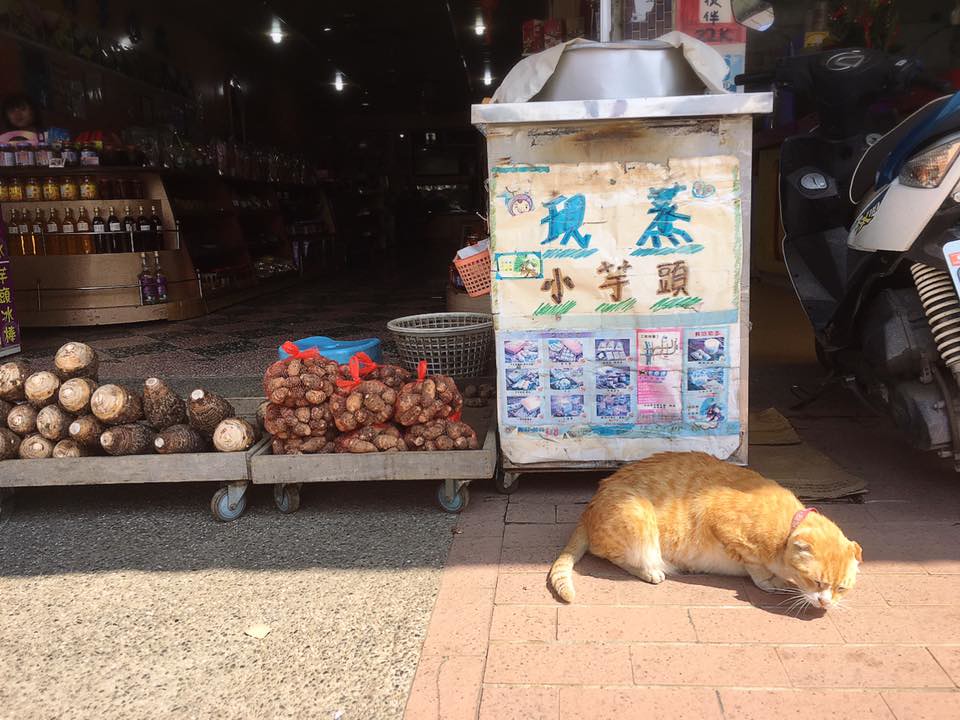 |
| taro + cat |
The next day after breakfast we hit the road again, this time back across the bridge and up into the hills past Nanhua Reservoir. We took the 南179 with gorgeous views across, noting how low the water seemed at the time (that was in early April - I sure hope things have gotten better. I'm going to assume they have as the only time of year when our destination on the far side is accessible is right when we went).
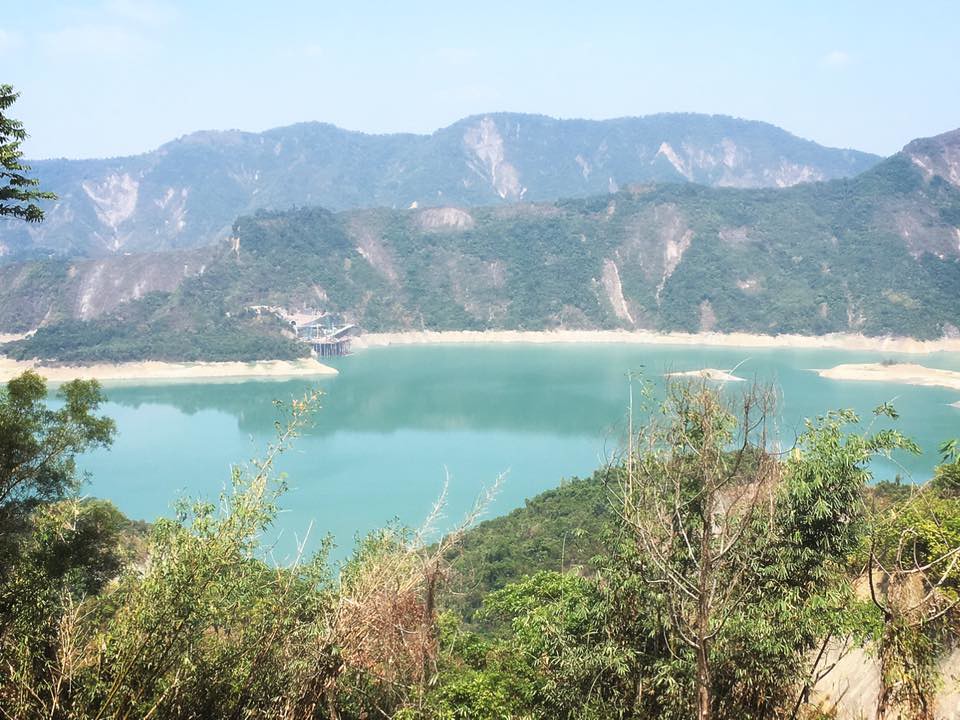
Our goal was Dadigu (大地谷), a small gorge on the far side, where the resevoir narrows considerably. What you do is this: there's a small parking lot about 500 meters up from the trail down to the reservoir, which is dry enough only at that time of year - I guess March/April but check ahead - to cross on foot. Then you can either head down from the parking lot or walk down the 500 meters or so to the main trailhead, which seemed easier. The parking lot is small and it fills up - be warned. We had to wedge ourselves in near the entrance and it was a bit precarious.
When you hit the bottom of the trail, what you see is this:
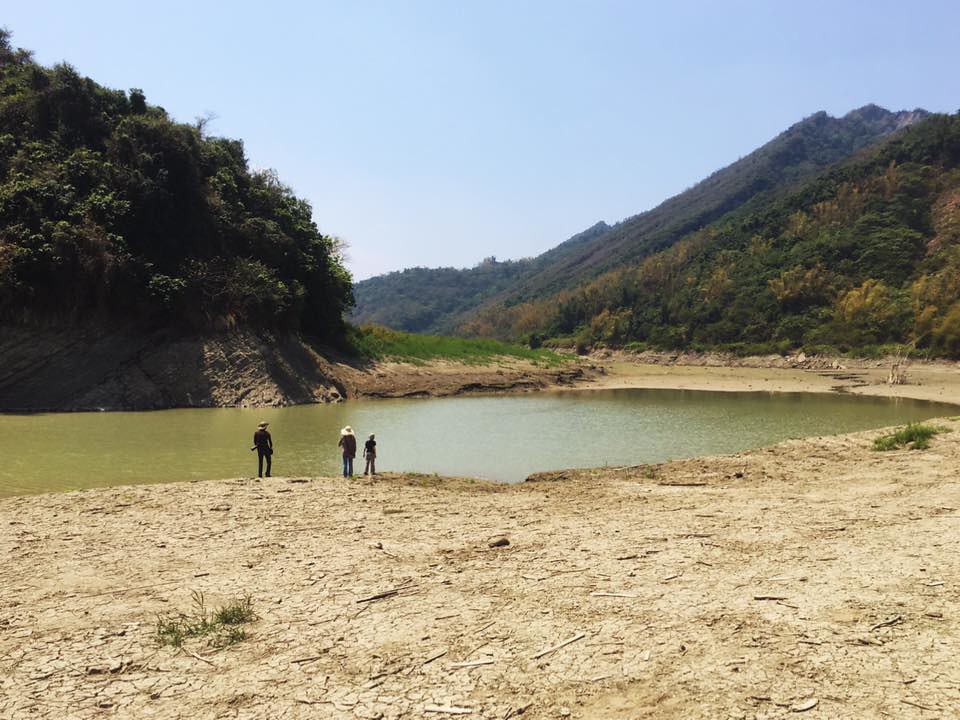
A dry reservoir bed, where hikers have already put wooden planks over muddy rivulets so you can get across to the gorge. Just follow the people - there are always people going there, the place is thoroughly discovered.
On the other side after an easy, flat but sun-baked hike (only go on dry days - trust me) you reach a small cave-like opening in the hill on the other side. Climb over the rocks and enter and what you get to is this:
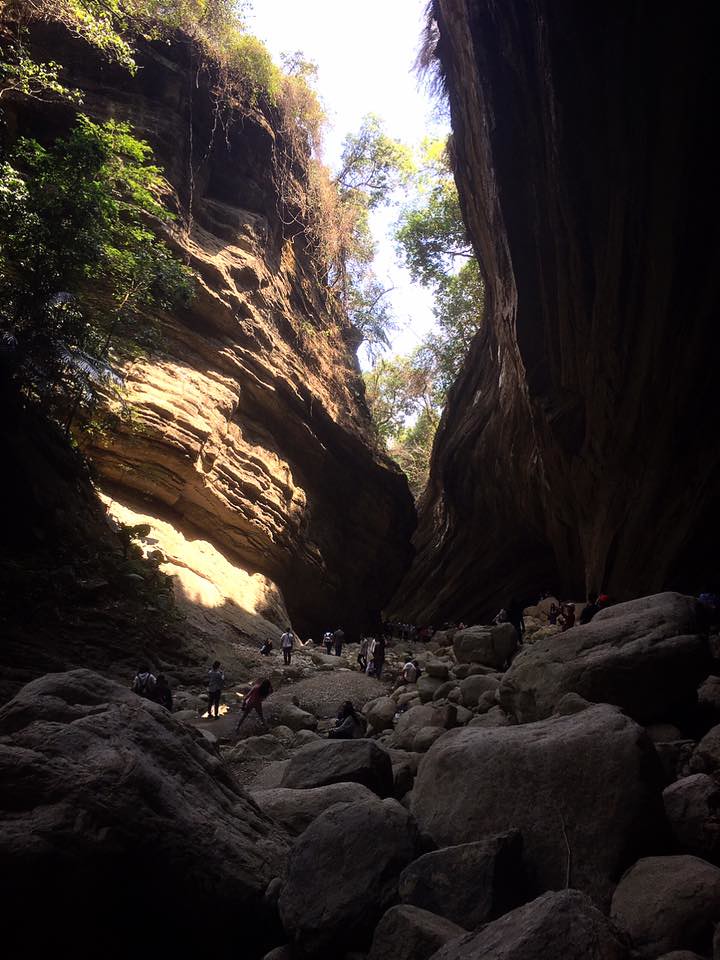
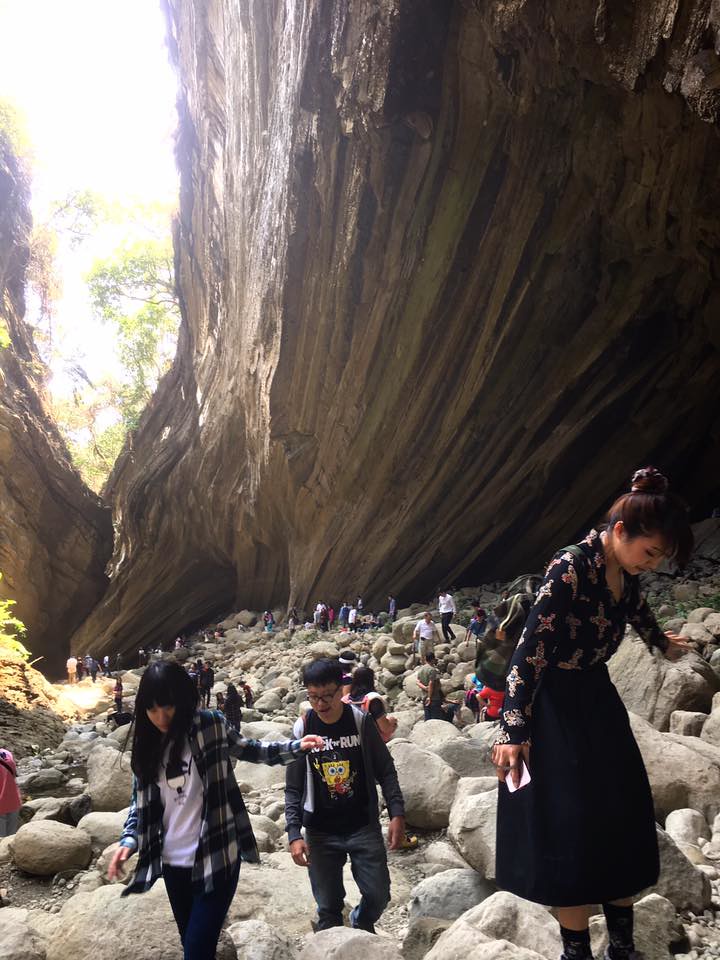
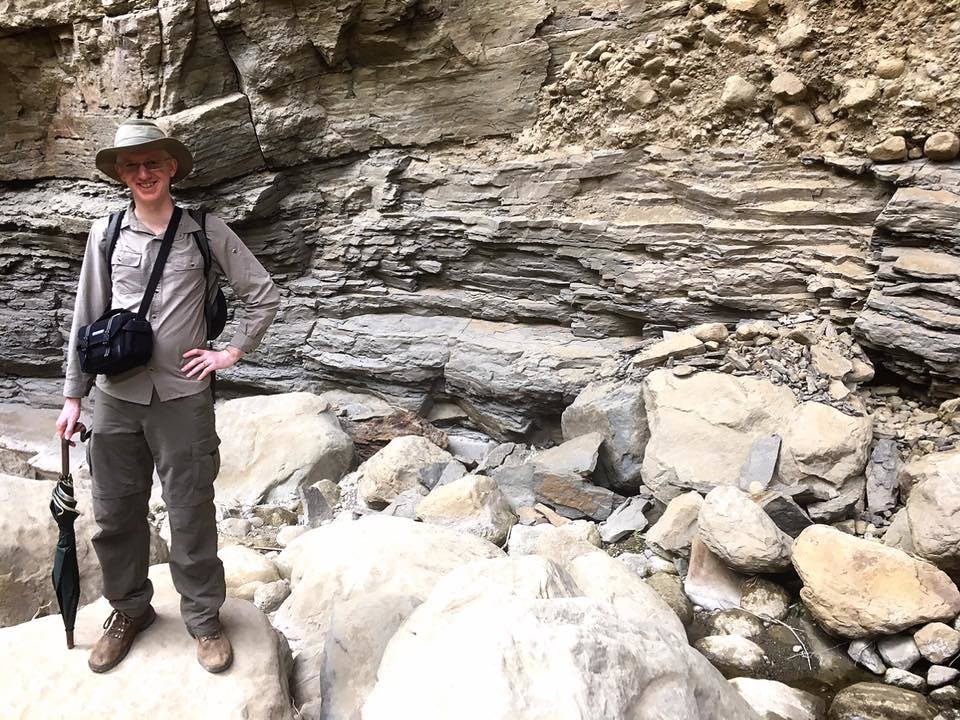 |
| Joseph matches the rocks |
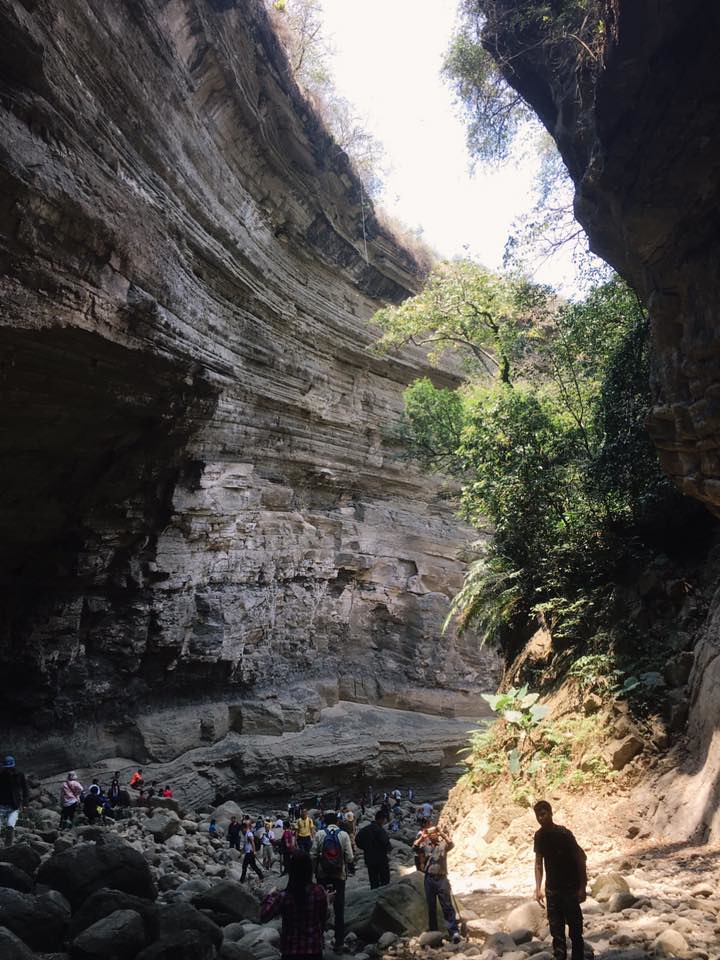
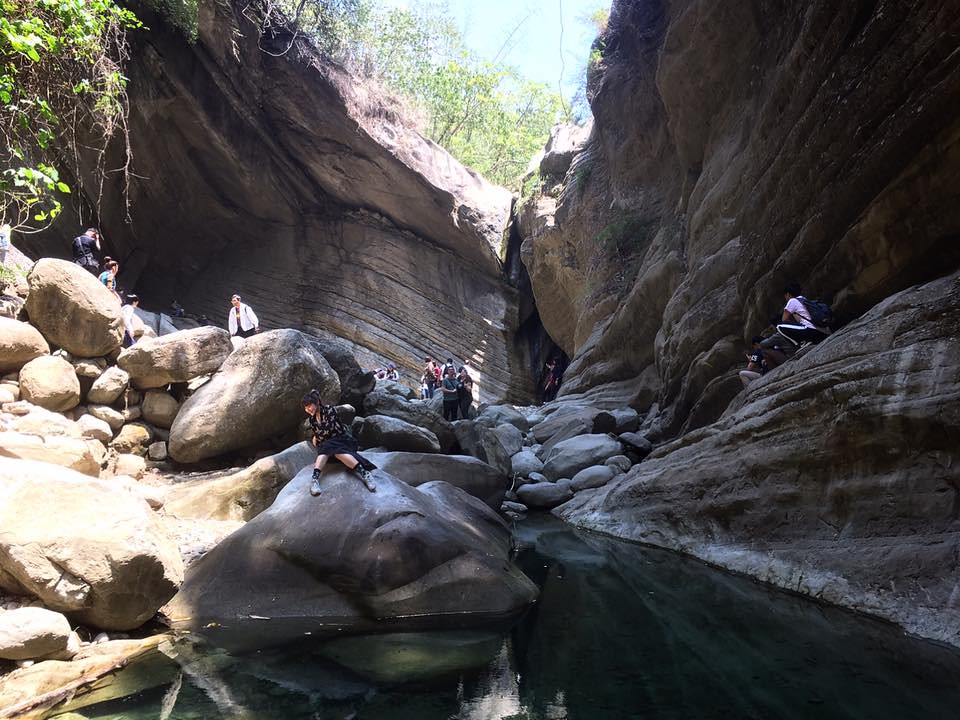
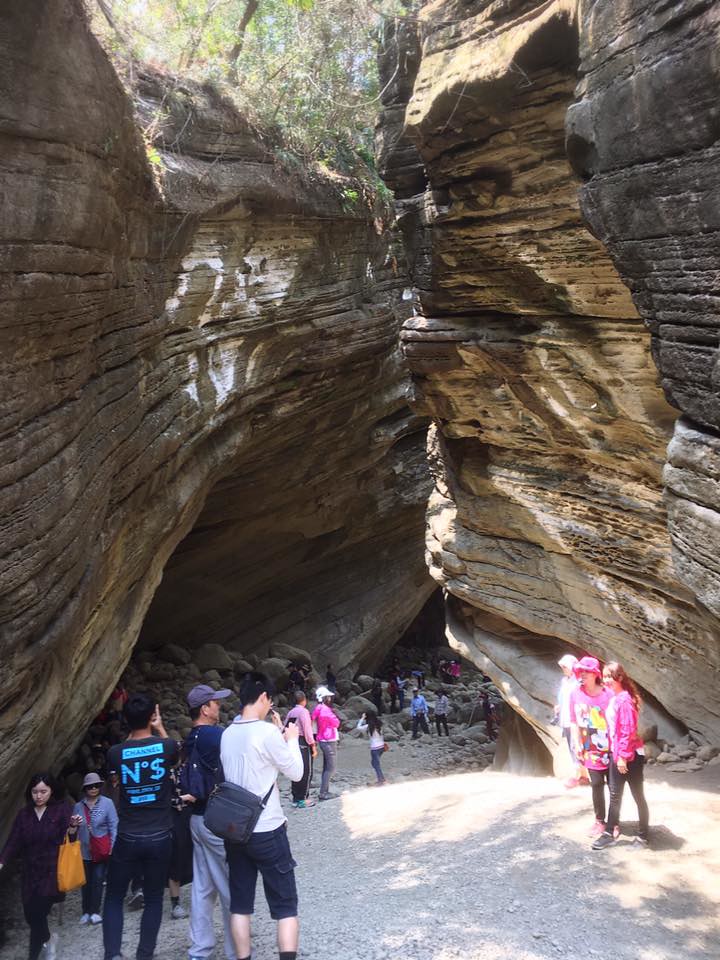

This place is so discovered, we weren't even the only foreigners there.
There's a ledge you can climb up to, and a watering hole at the far end with a small waterfall that is safe for a dip, but not deep enough to swim in. I love a good dip in the water, and we'd just trudged across a baking reservoir bed in the heat, sun and dust, so I took off my hiking boots and walked right in, happy I was wearing my quick dry hiking slacks. The guys did not join me.
We then hiked back up to the car and hit the road, reaching the plains in time for a (late) lunch.
If there are two things I love, they are mangoes and Taiwanese political history. So, it's no surprise that I asked to include a stop in Yujing - an otherwise unremarkable little town on the Tainan plains - on our itinerary. It seemed like a good place to go for lunch. We had a thoroughly unremarkable lunch in the sleepy town at midday - it wasn't bad...it was just...fine. I guess. In fact, it was so "um, fine" that it led us to create a little jingle: Everybody loves food that's fine!
I then remembered that there was no reason at all to stop for mangoes as they weren't in season. Whatever, my plan was perfect, y'all are just haters. I bought some dried mangoes elsewhere. They were good, I'll have you know.
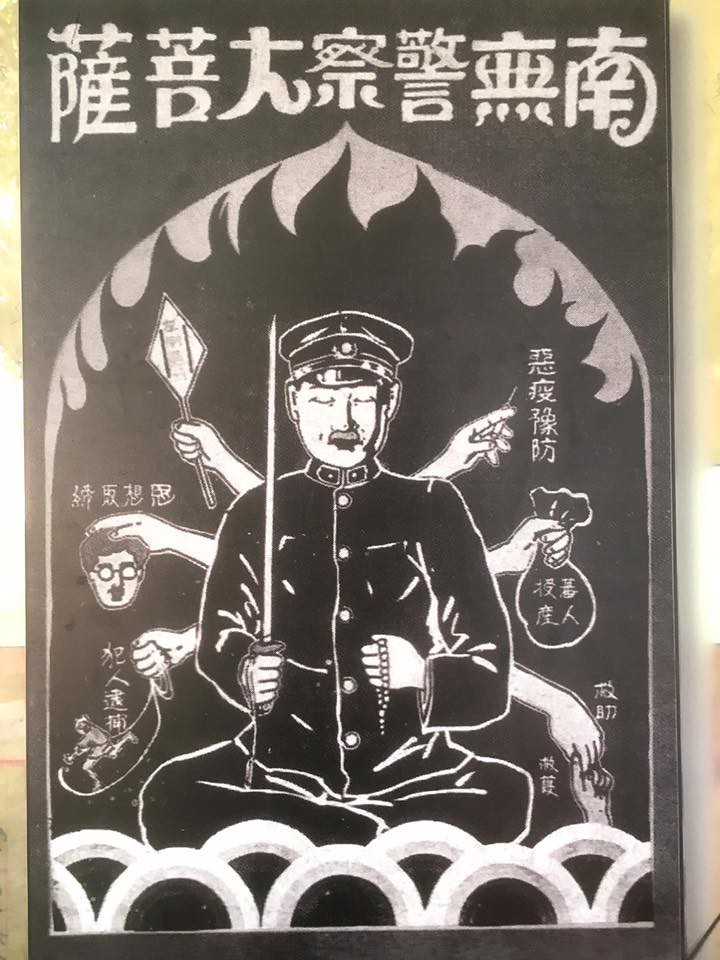 |
| A political cartoon in the Tapani Incident Memorial |
We then headed to the Tapani Incident Memorial (噍吧哖事件紀念園區), which is on the outskirts of Yujing town. I had estimated that it wouldn't take us long and I was right: it's a small area, and all of the exhibits are exclusively in Chinese (when that happens I don't try to read everything, I just skim whatever looks interesting). I can't blame them - I would not expect too many foreigners to drop by. But I'm a nerd so we did.
I won't bother to tell the story of the (failed) Tapani Incident here - there's a tiny little summary on Wikipedia, and it's memorialized in the Kou Chou Ching song Civil Revolt Part 2 - well, if you speak Taiwanese or Chinese that is. The song starts with the Taiwanese lyric "這是誰的土地" (Whose land is this?)
And, you know what? It's not mine, not really. But I love it anyway.
Anyway, I don't have a folksy attachment to this particular historical incident or anything, I just thought it would be interesting to swing by. The temple across the street, which played some role in the incident, is also quite atmospheric.
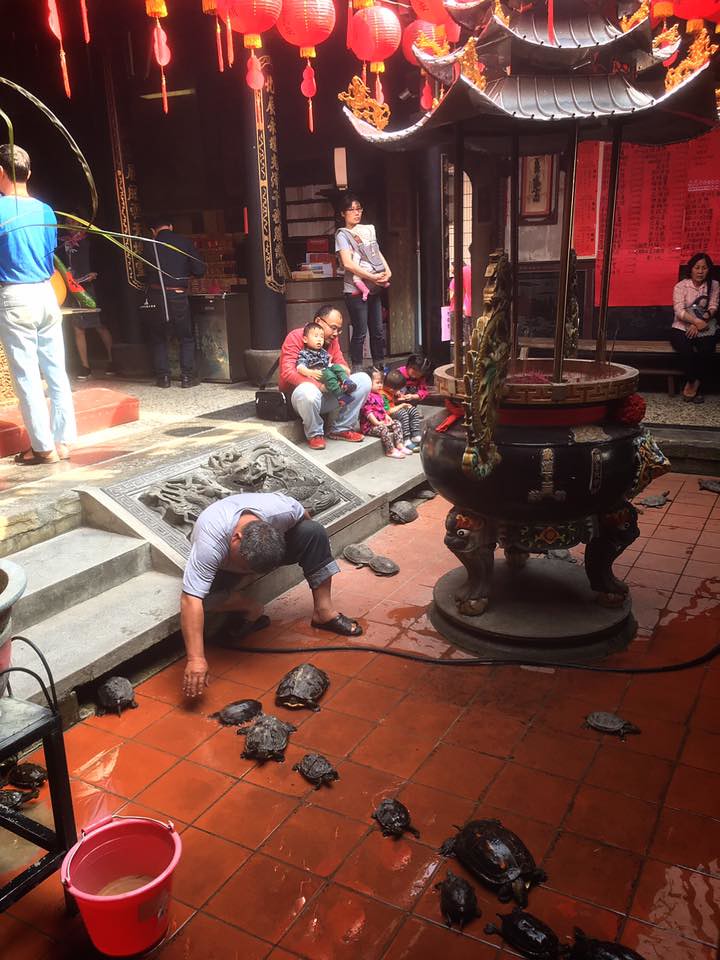
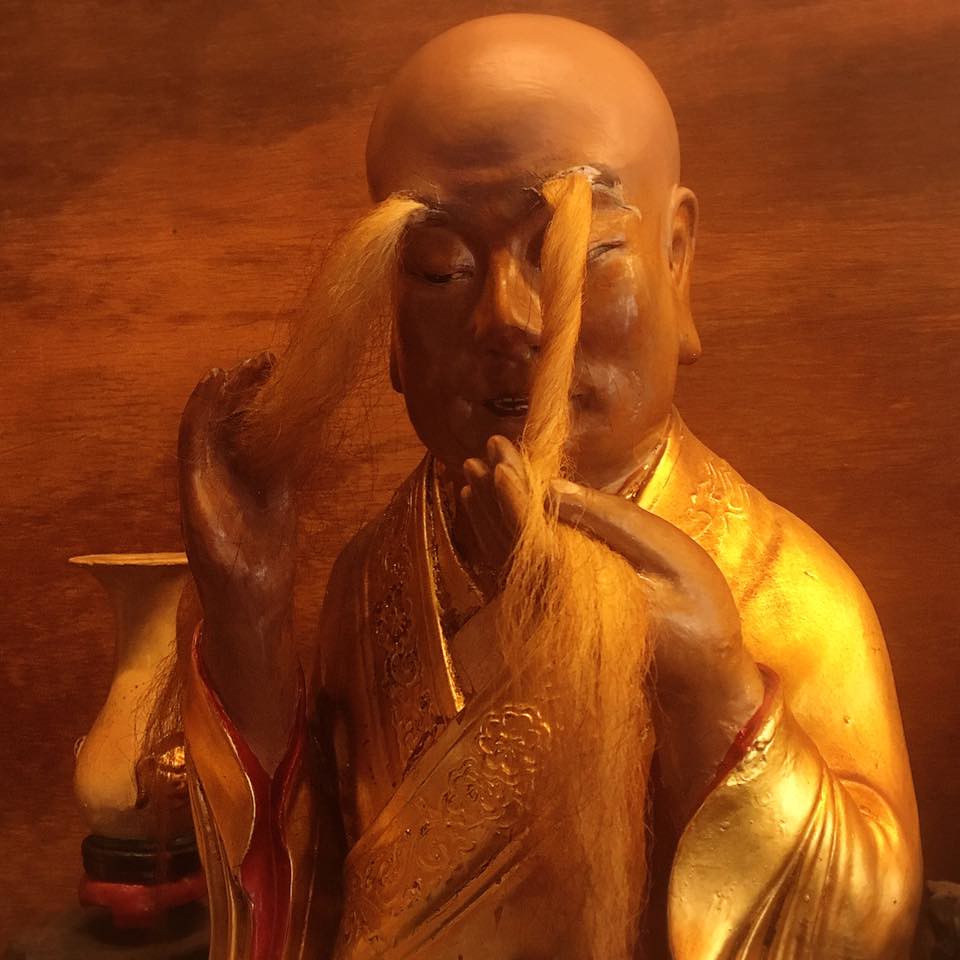
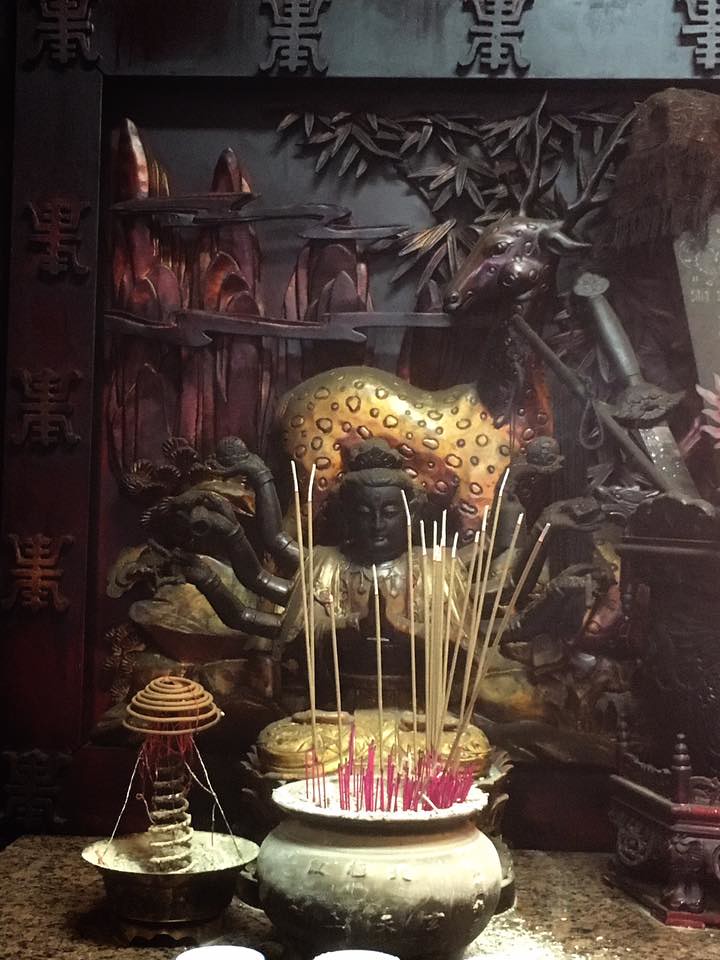
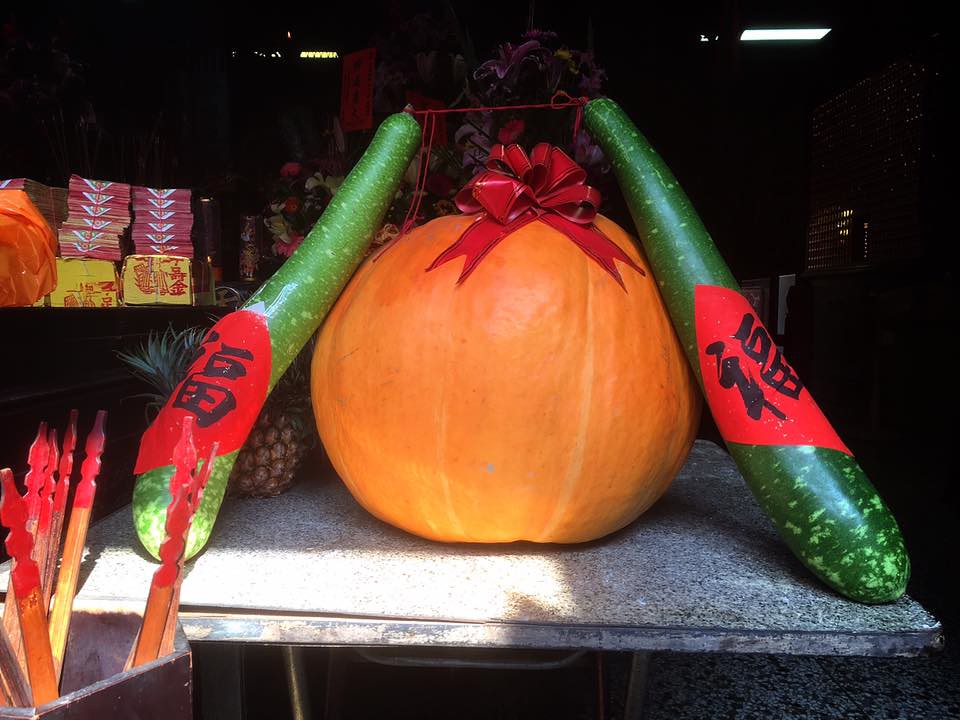
I love a good temple, and this was a very good one.
Anyway, we also found a gelato shop - not so different from something you might find in a smart shopping area downtown in any of Taiwan's larger cities - selling all manner of gelato, many of them based on quintessentially Taiwanese flavors. Along with mango, chocolate, lemon, rose and other flavors, options included milk candy (the Taiwanese kind), milk tea and Pipa Gao cough syrup (no, I am not making that up):
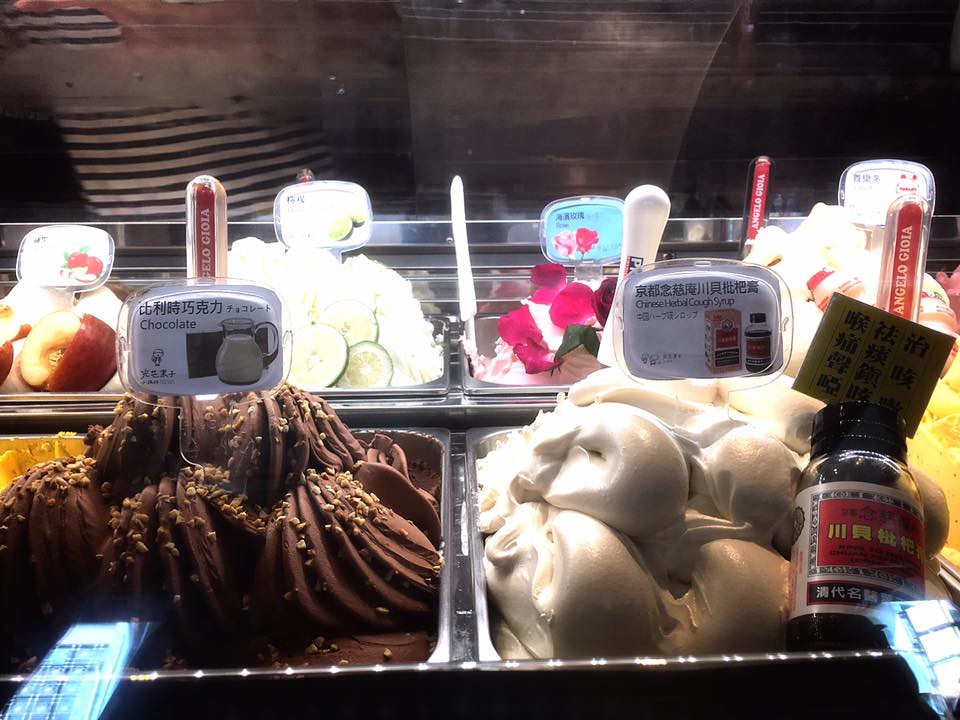
And you know what? It was really good gelato. Perfect for a sunny tropical day.
We also found some creepy abandoned children's rides and a few cats:
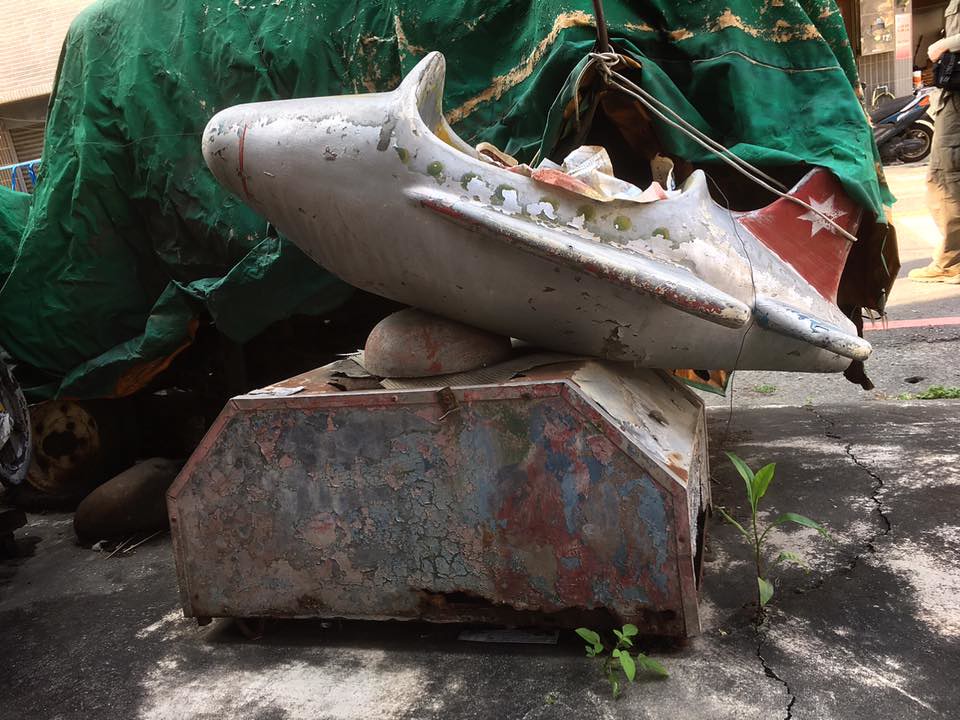
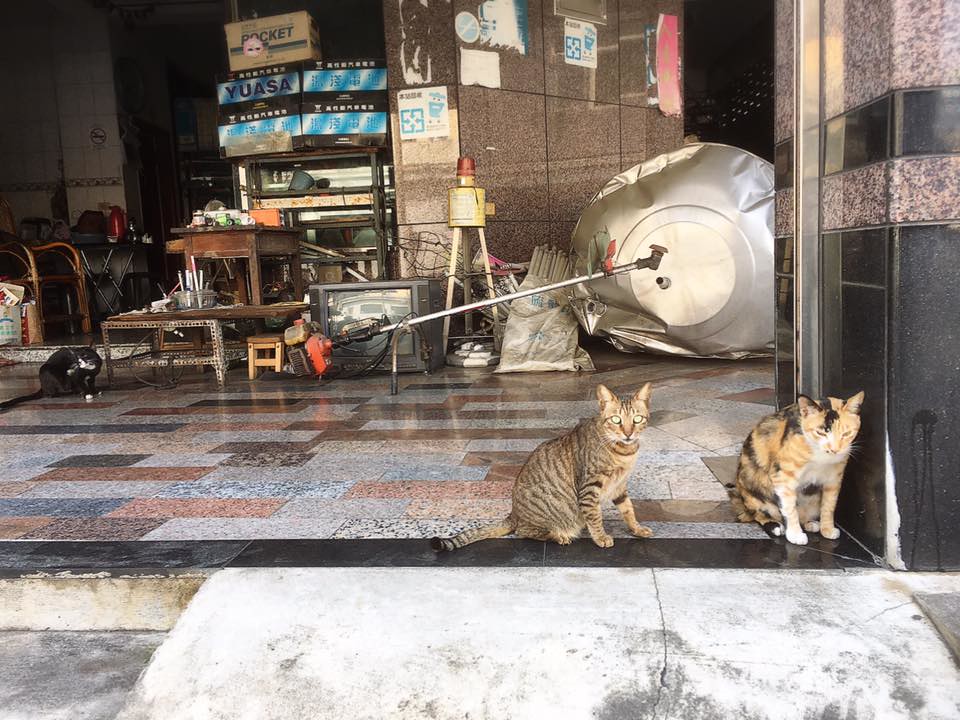
...and that was that for Yujing.
We took the 3 out of town, headed for Guanziling (關子嶺), with plans to stop at the Chiang Family Compound (鹿陶洋江家聚落 - a little family village for the Chiang family, full of historic old-style houses). Although the sun was exactly wrong for taking good photos, here are a few:
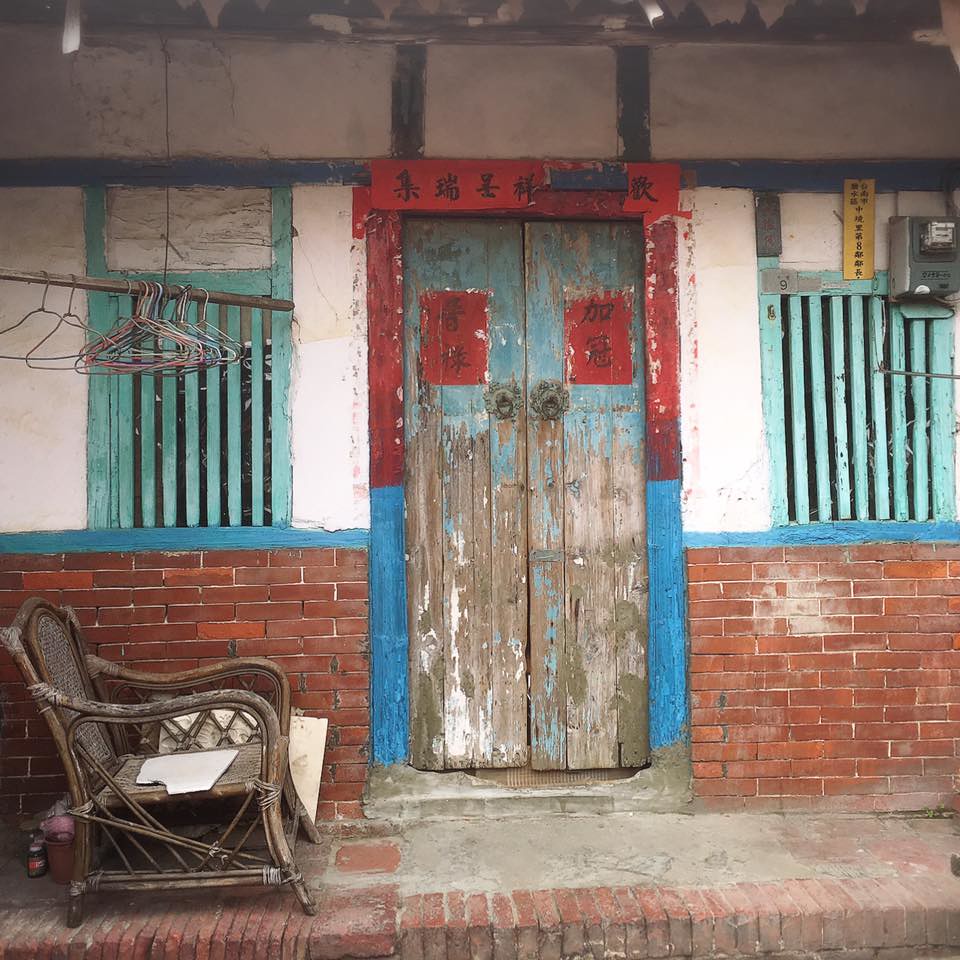
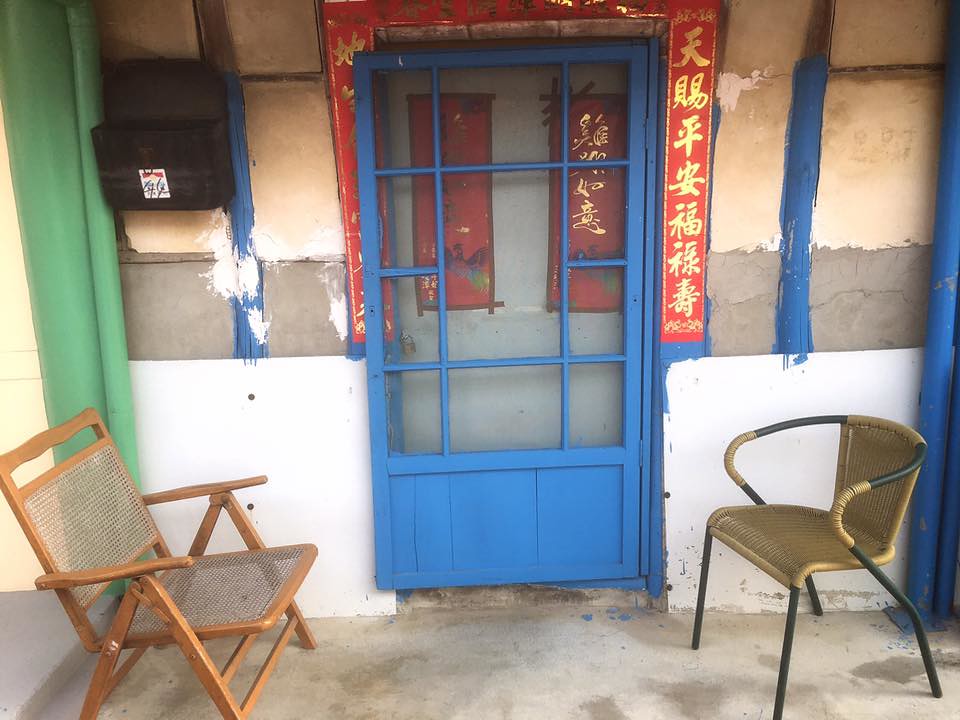
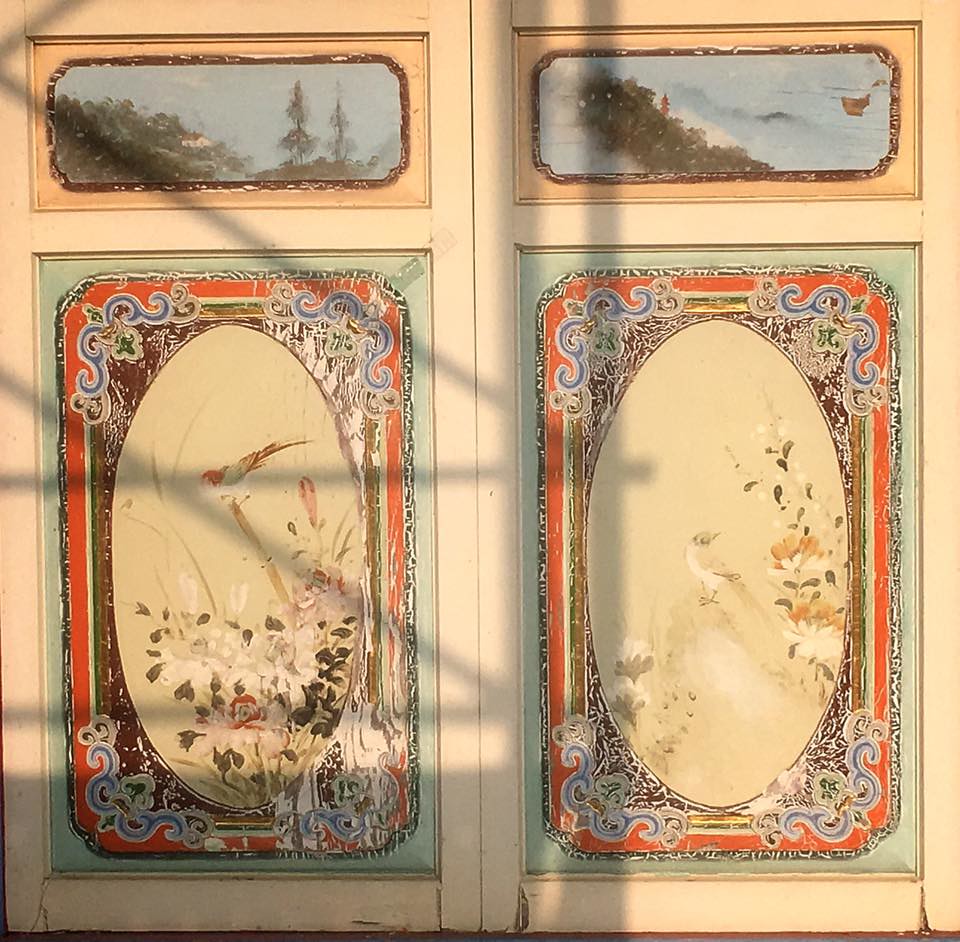
This was our last stop on the plains for the day. We then hit the mountains, stopping along the way for coffee and a nice view as the sun went down:
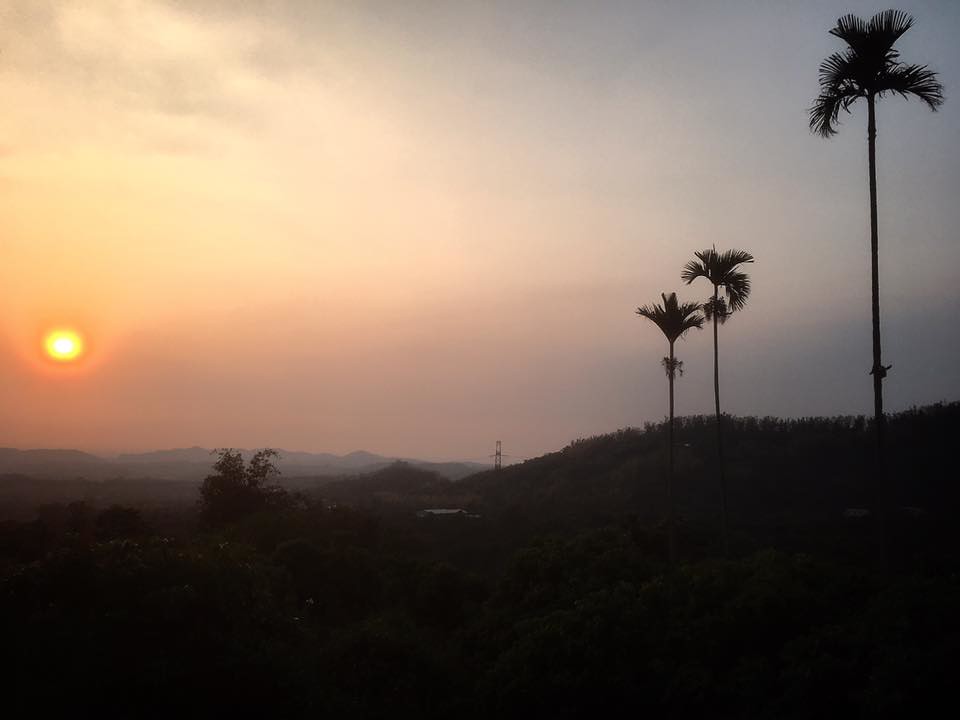
We hit Guanziling after dark. The town is famous for three things: muddy hot springs, chicken you tear apart with your hands, and the "fire on water" (a combination of flammable gas and hot spring mineral water which pours out of the hillside, so it looks like the fire is emanating from the water).
I took a muddy hot spring bath at our hotel, which I don't have a picture of. The chicken was good:
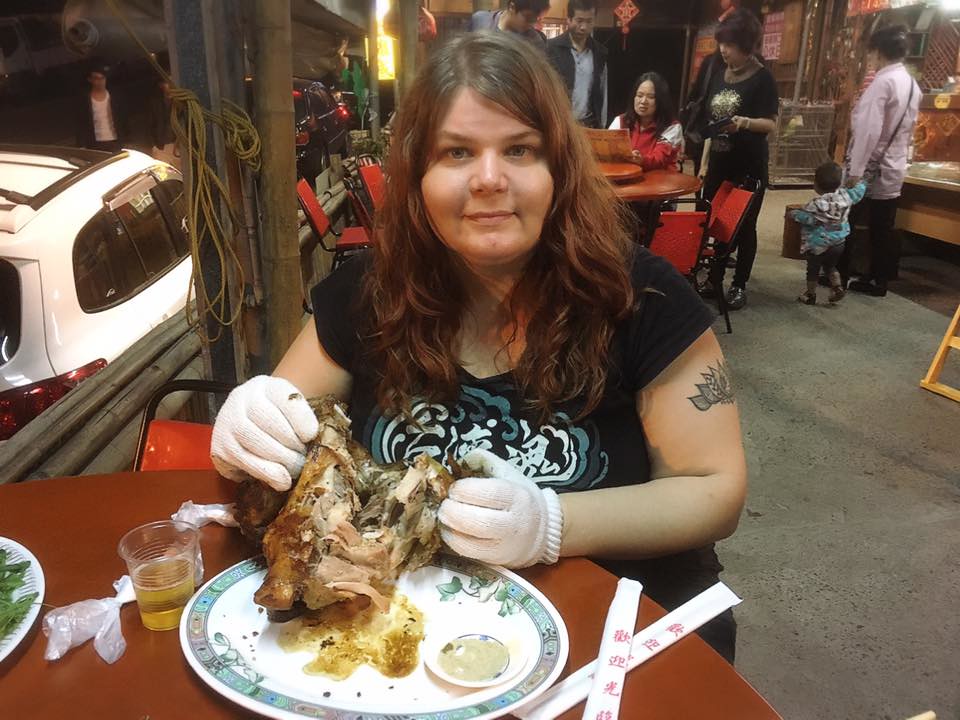
...though that is a horrible picture of me.
And we did stop by the fire-on-water thing, and found it thoroughly unremarkable. A total tourist trap.
Drank a lot of beer though.
The next morning we packed up the car for the final time, stopped for coffee with another lovely view:
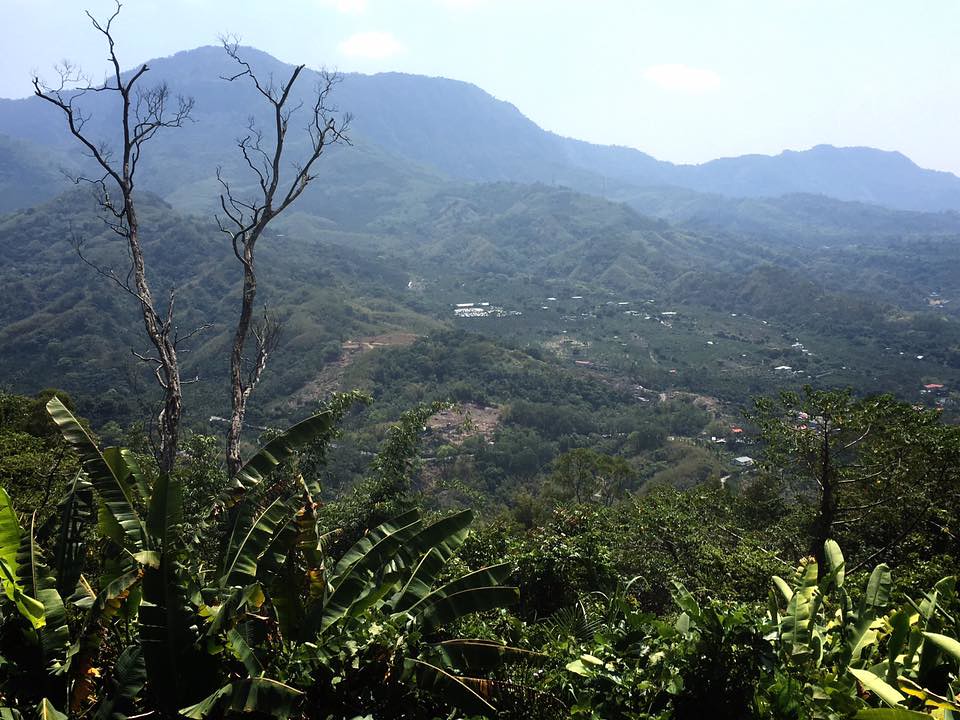
And then stopped at a temple in the hills (火山碧雲寺) before hitting the plains again. The temple is worth it for the views alone, but also has some nice stuff inside:
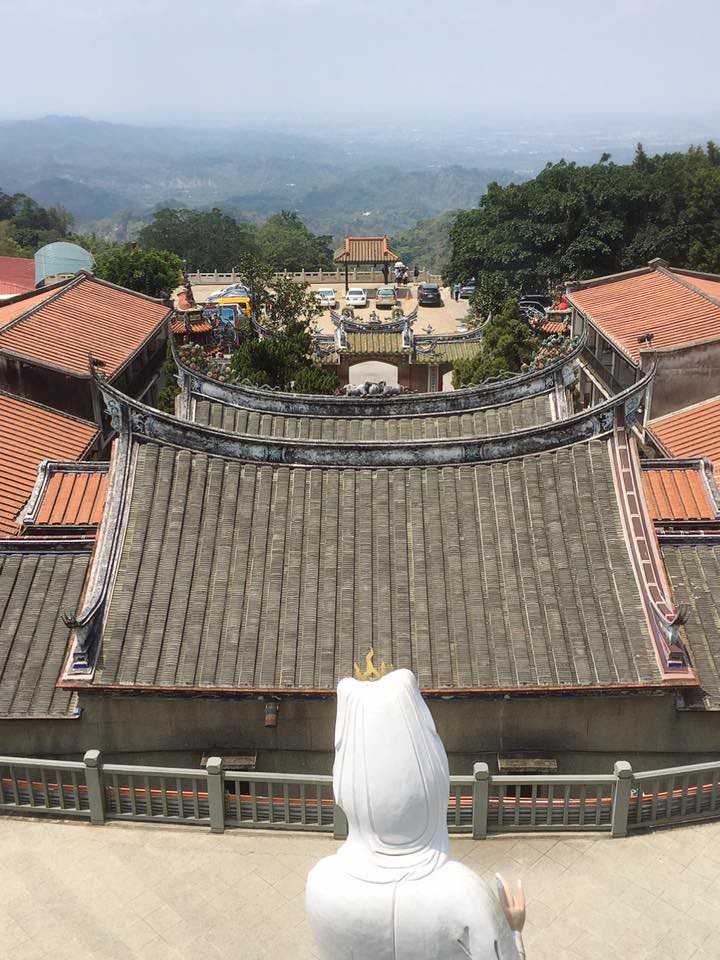
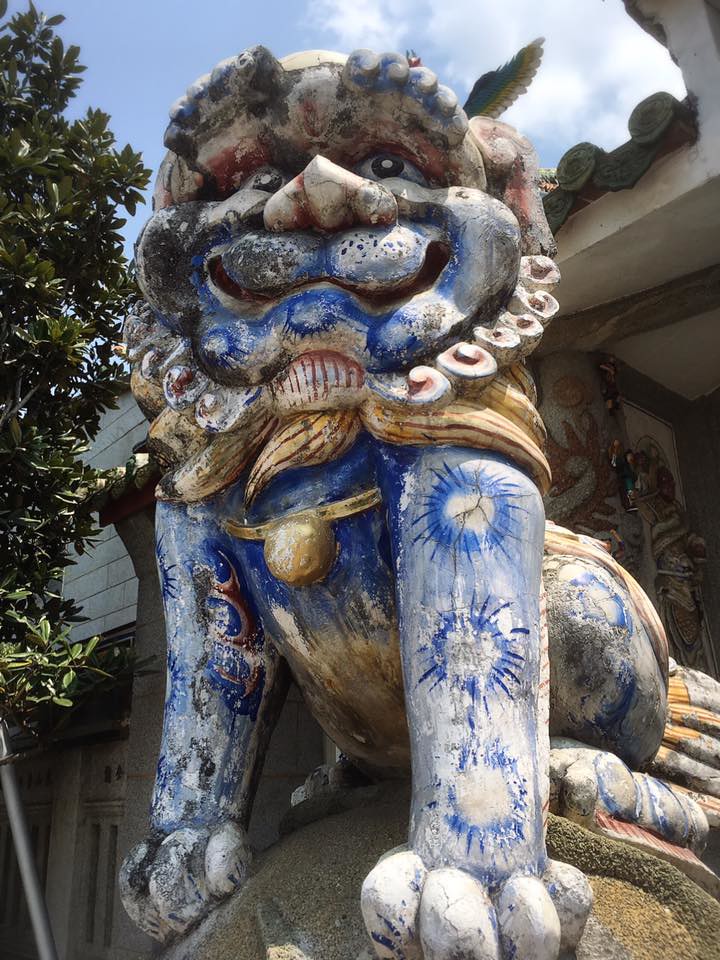
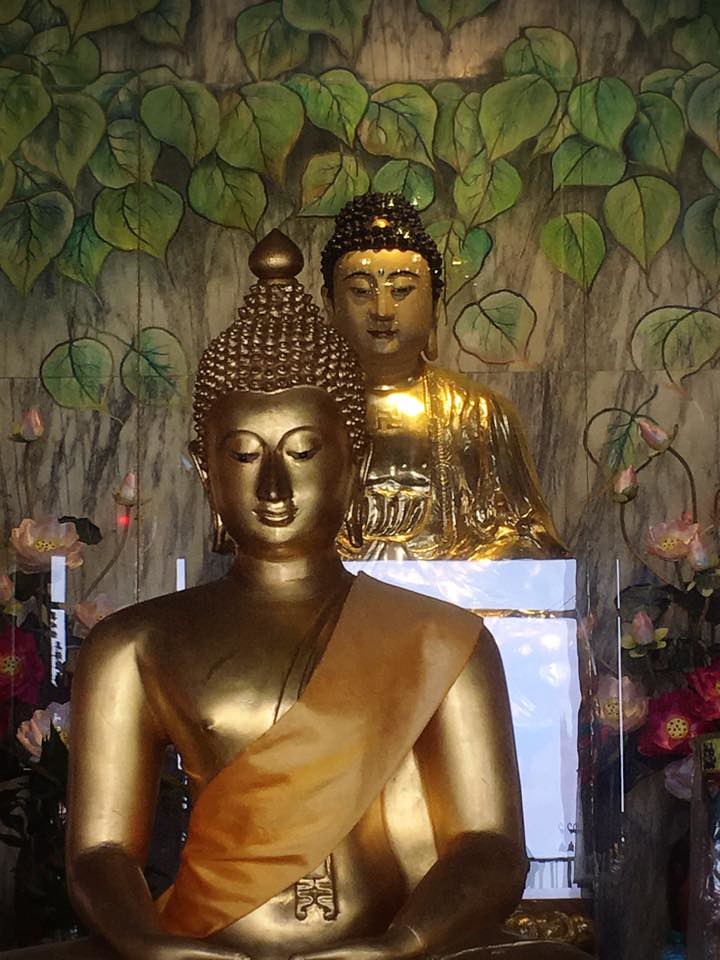
We drove down to one of those "flower streets" - this one outside the town of Baihe (白河) that are so famous in Tainan, which was supposed to be at the end of its blooming season but still covered with flowers, and we were sorely disappointed:
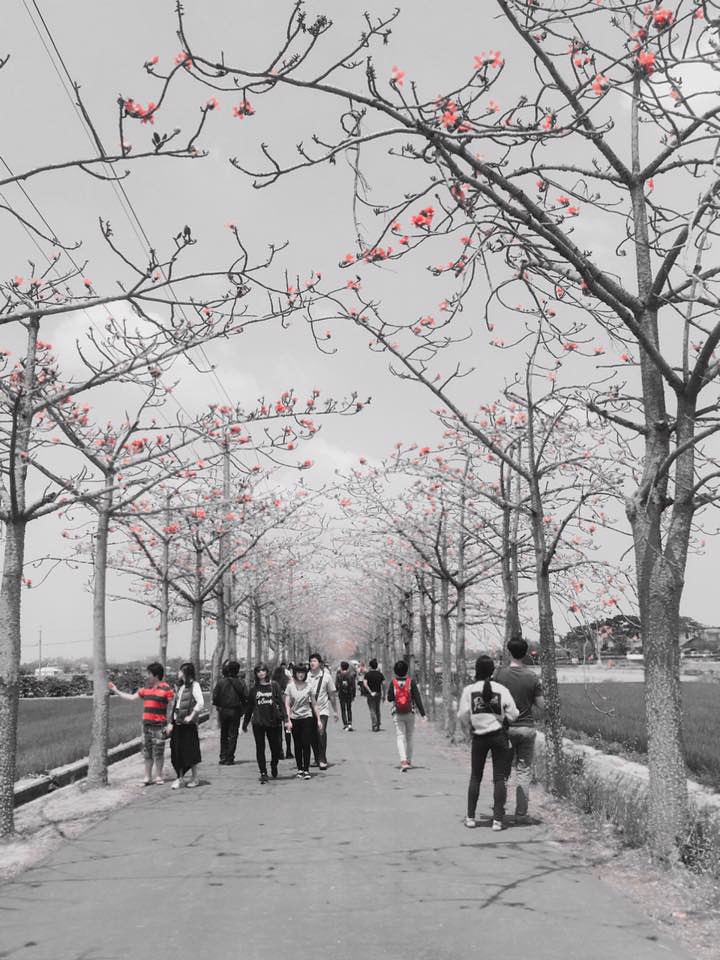
The only way to make the picture even a little interesting is to filter it to hell and back. Meh. I like it when the photos are good without having to do that.
We then headed to the tiny town of Jingliao (菁寮), and I'm not telling you how we got there because I honestly have no idea. We took a lot of weird back roads, which were great for scenery but not exactly great for remembering how exactly we criss-crossed the county.
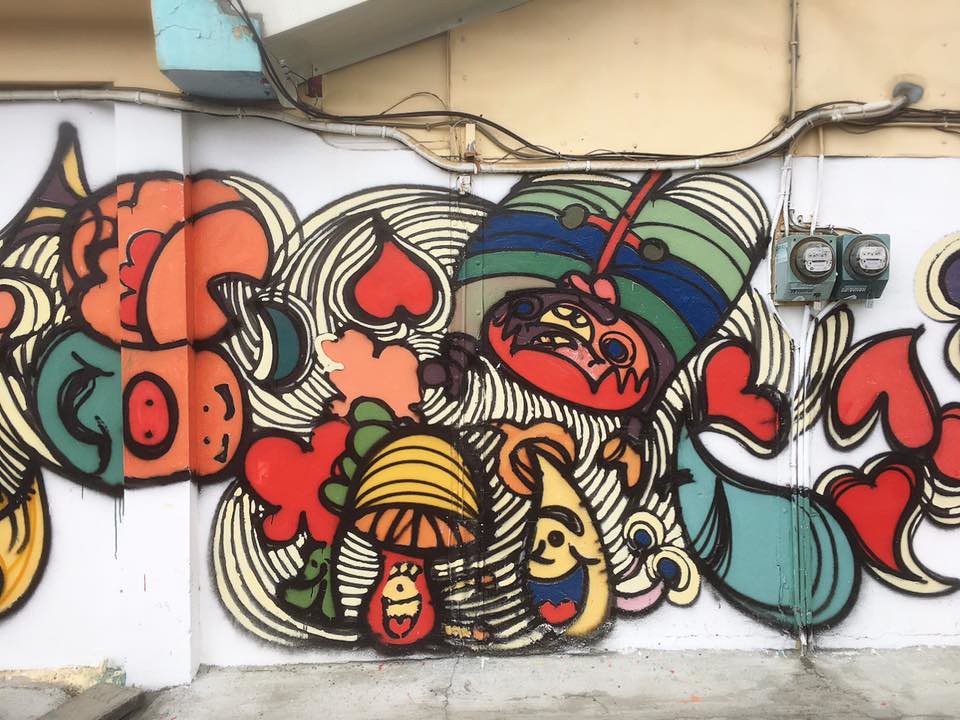 |
| You see weird things on weird back roads. |
Jingliao is well-known for having some of the best-preserved historic architecture in Taiwan, and yet although it's meant to be something of a tourist draw, there was hardly anyone there. That's fine by me. Though it did make it hard to find a decent lunch - I think we just ate some completely flavorless steamed buns (Everybody loves food that's fine!) and walked around. It is a truly pretty little town.
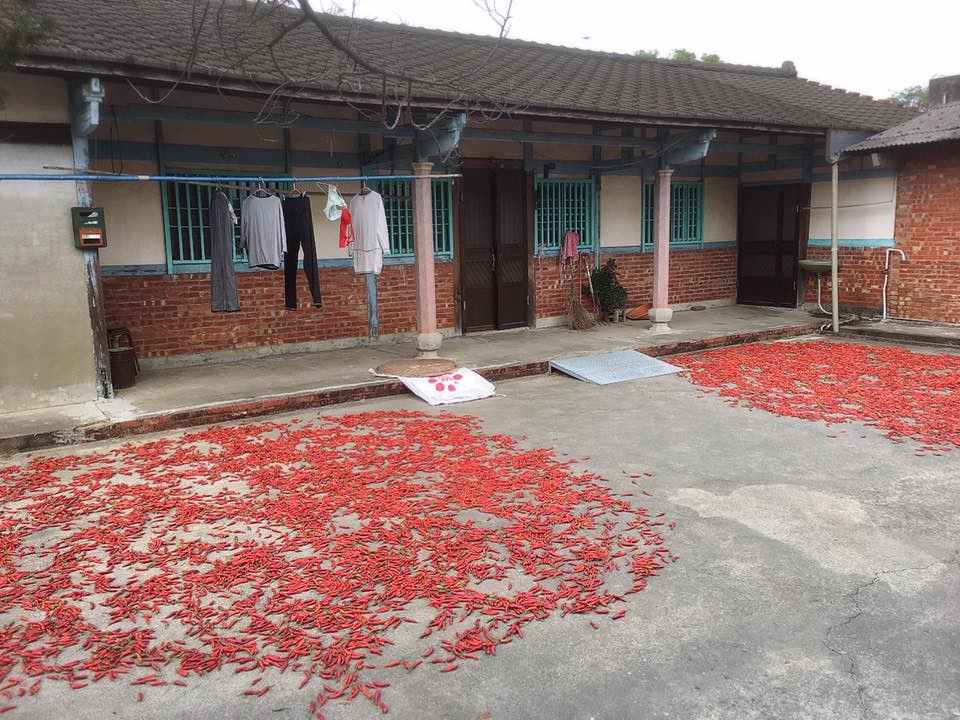
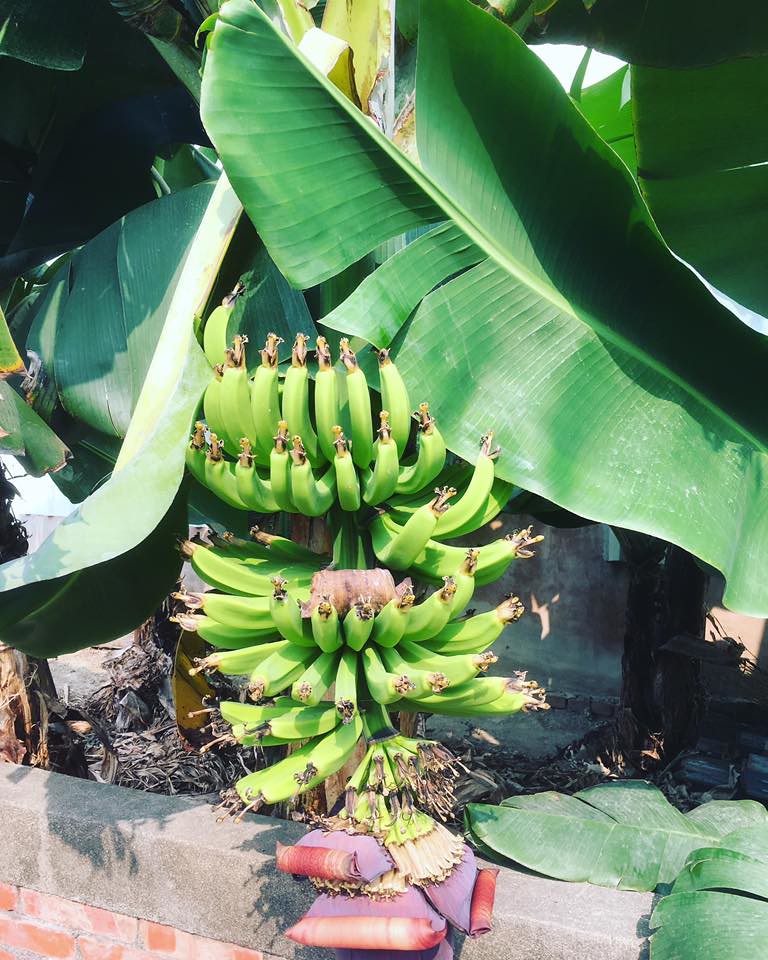
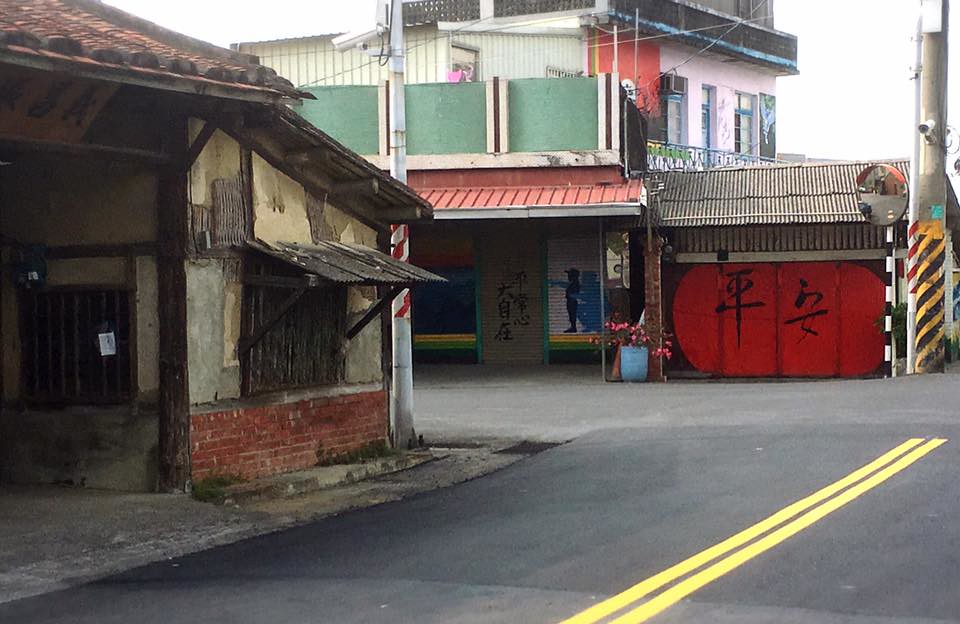
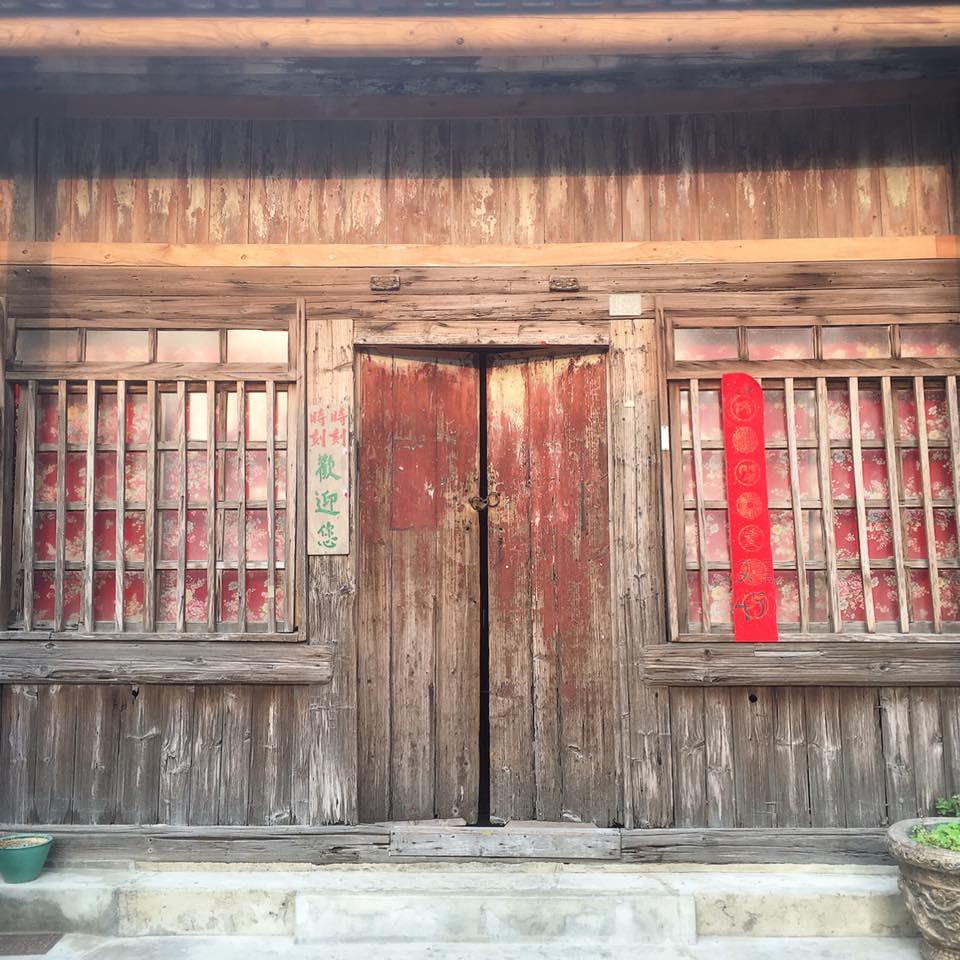
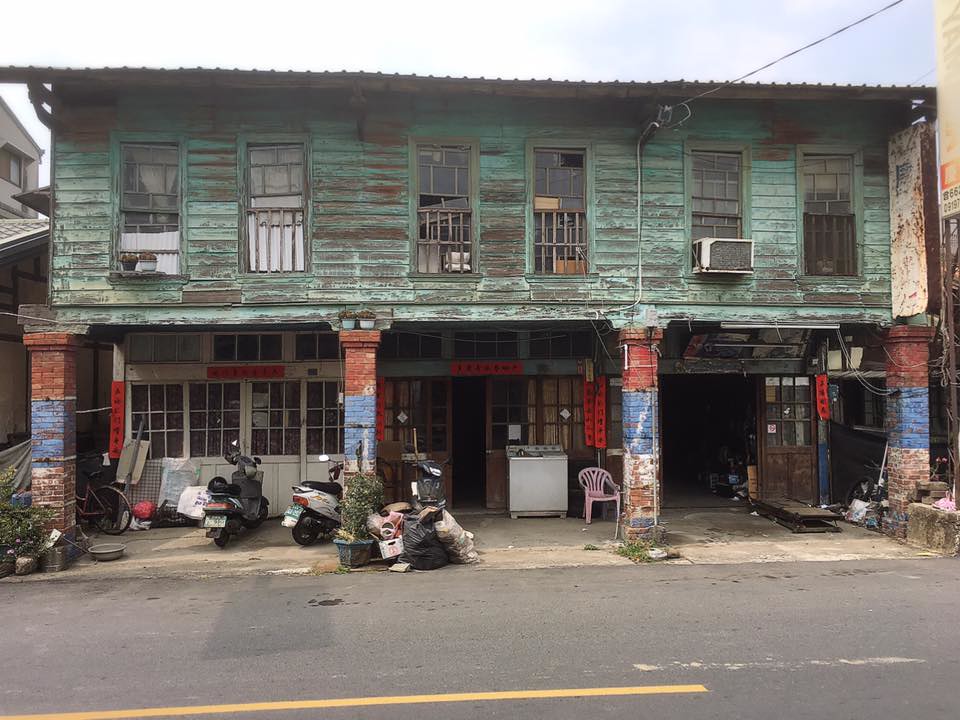
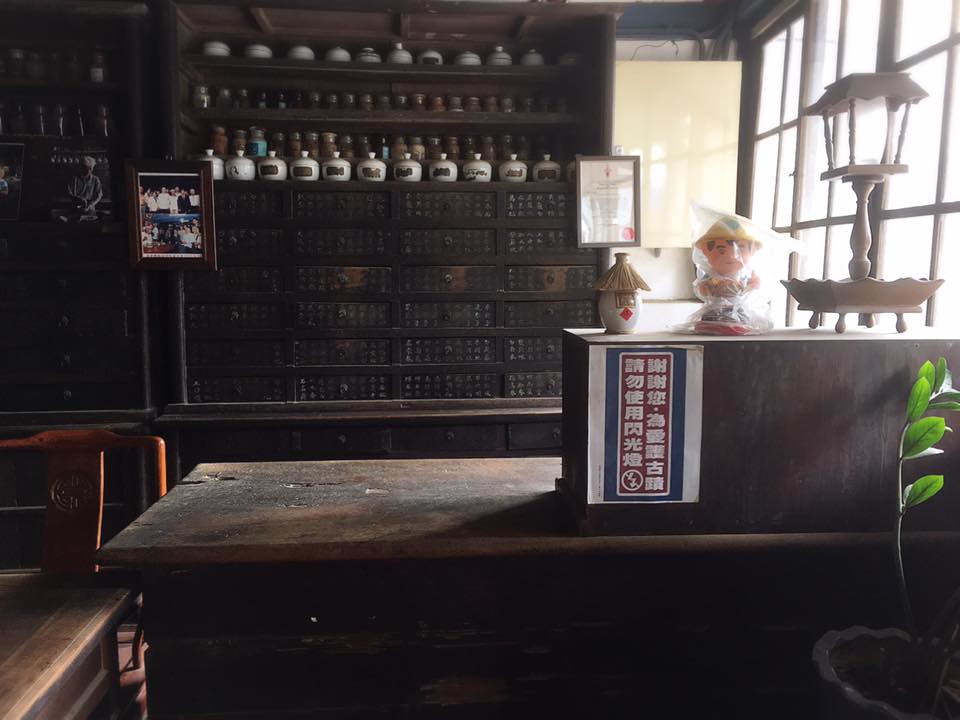
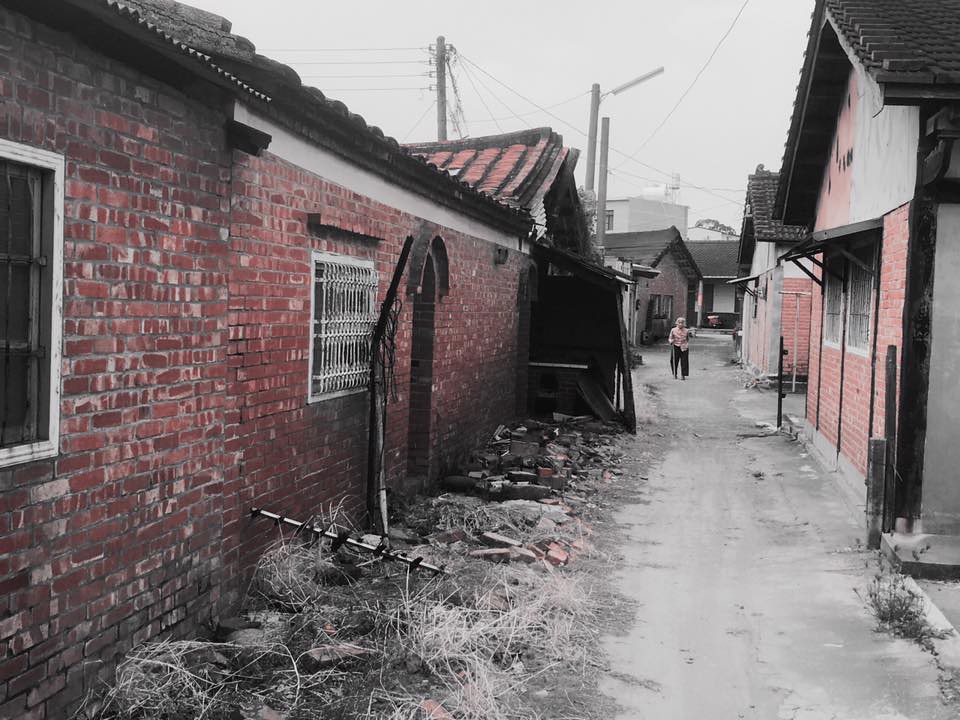
But, pretty as it is, there's not a lot to do. So, we found the cow we'd parked near (not joking), navigated back to the car and headed for our final stop of the trip: Yanshui.
Yanshui is famous for holding the Beehive Fireworks Festival every year, which I took my cousin to in 2016. It was fun, but once is enough. We also arrived after dark that time, and didn't get to walk around what was a really cool little town, worth visiting when they aren't shooting firecrackers at people.
Unsatisfied with our hilariously sad Jingliao "lunch", our first stop was a Vietnamese restaurant that happened to be open all afternoon (a lot of restaurants close and we were trying to avoid a convenience store meal). It was quite good, in fact. Then, we wandered in the backstreets a bit, passing some lovely Japanese-era architecture. The most famous historic site in town is an old wooden tower - which I didn't see and learned nothing about, because it was closed for renovation at the time. Oh well. I'll blog it if we ever return.
But we did visit the Holy Trinity Catholic Church, which is famous for its murals depicting Biblical figures as Chinese deities, and then walked down Qiaonan Old Street (橋南老街), which was lovely and had almost no people, though we did find a cafe to take a rest in. Yanshui isn't that small, and doesn't have public transit, but it was just urban enough that none of us wanted to drive, so we walked. And walked. And walked. A place to sit for a bit was a welcome respite.
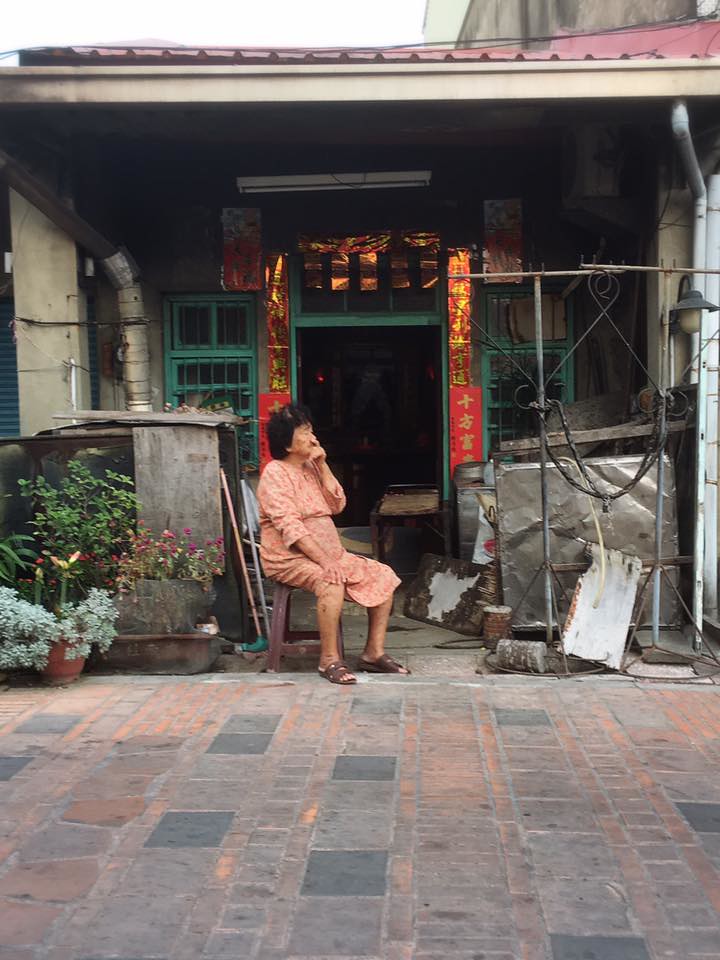
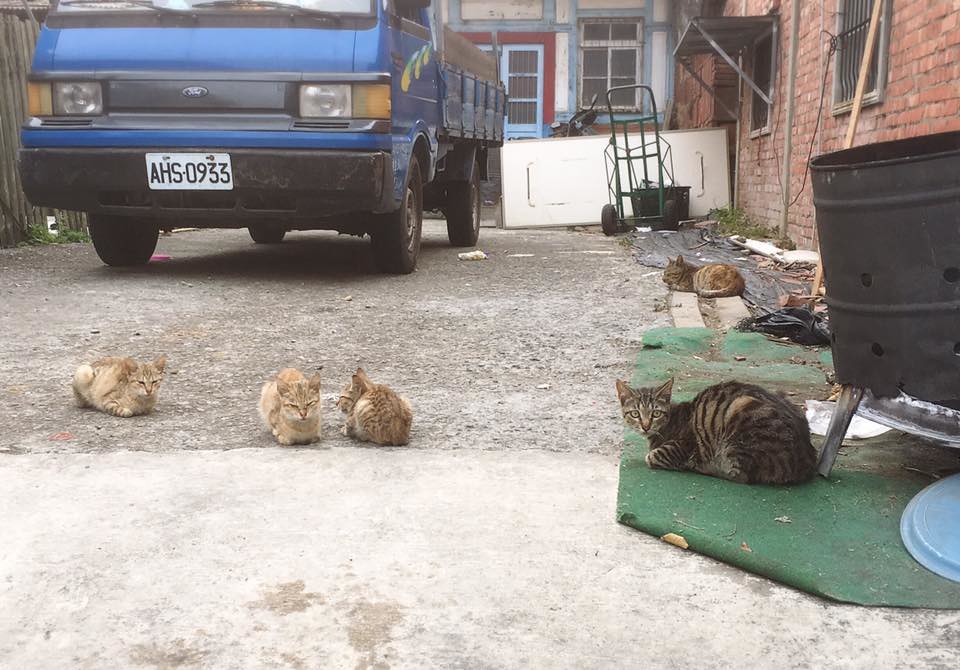
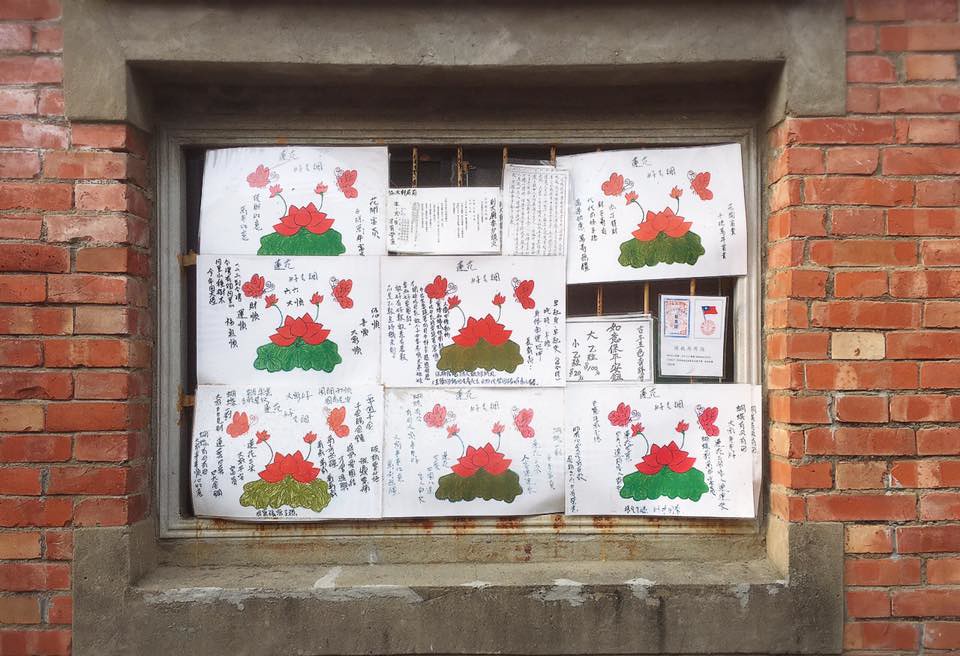
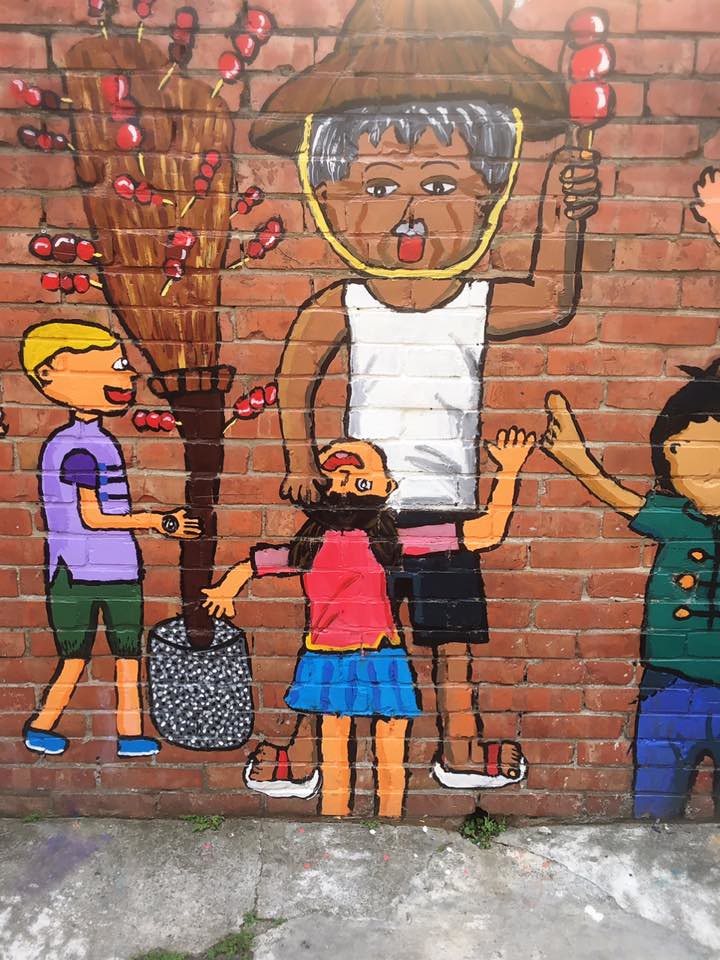
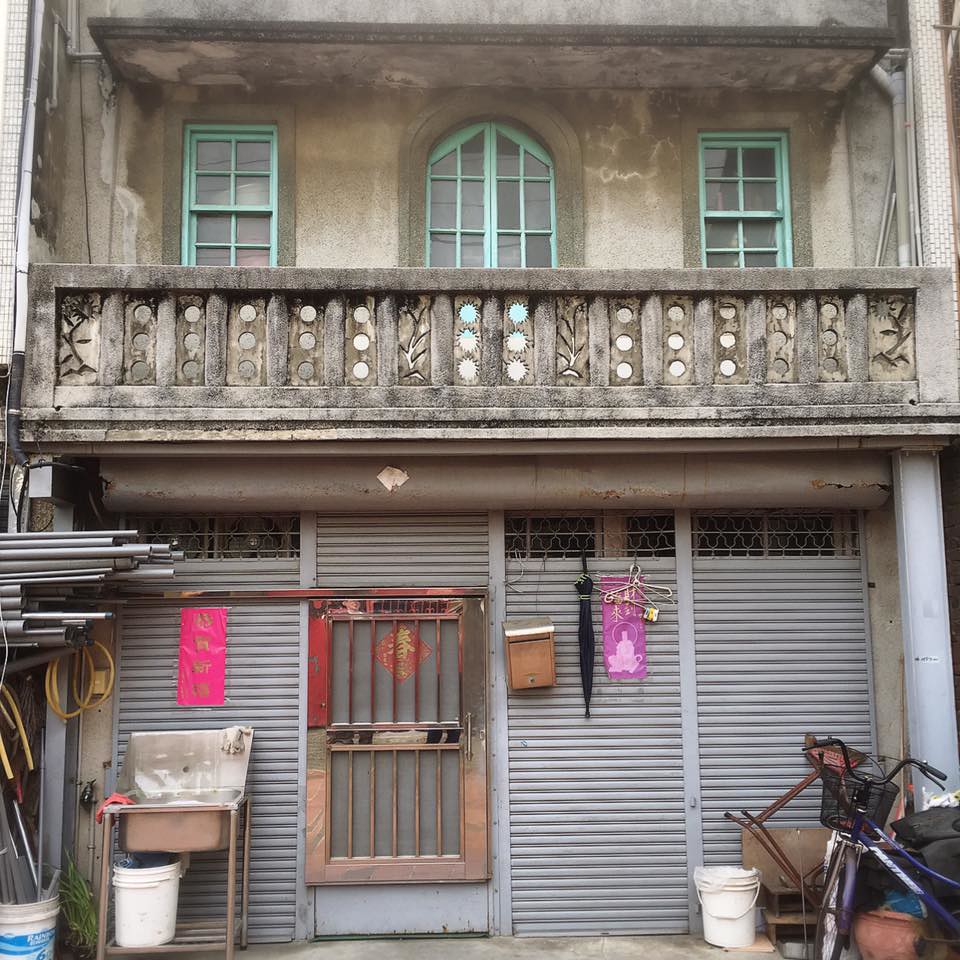
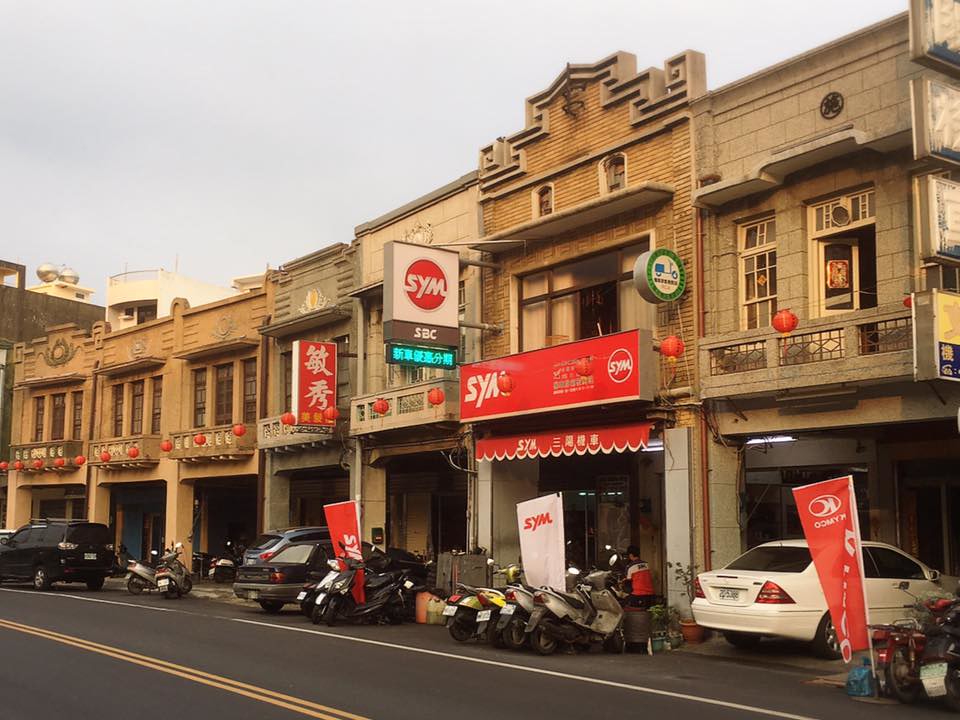
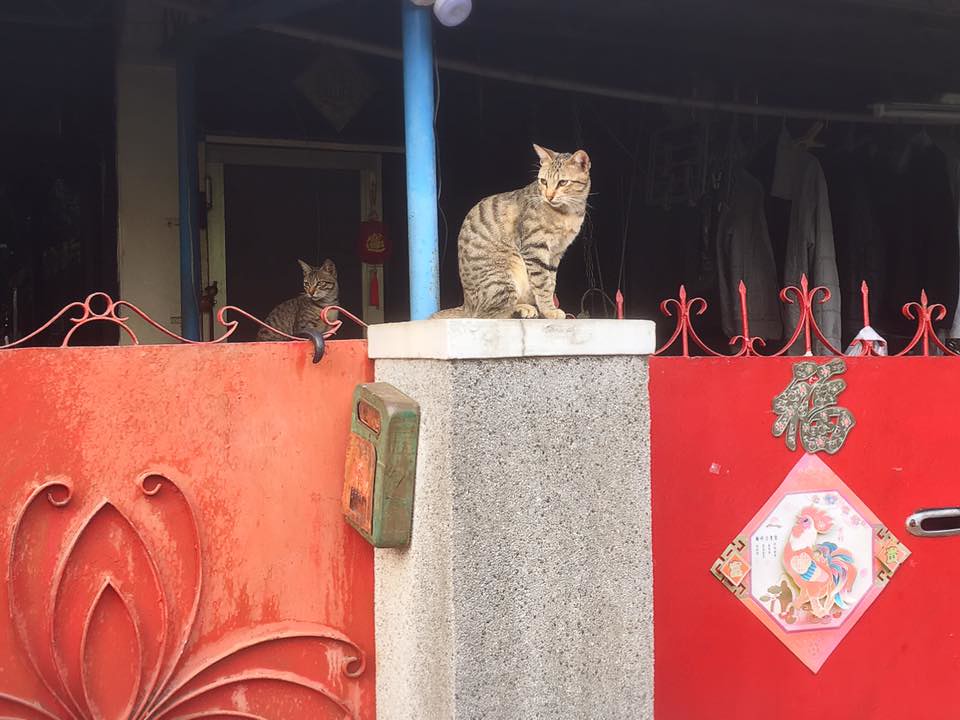
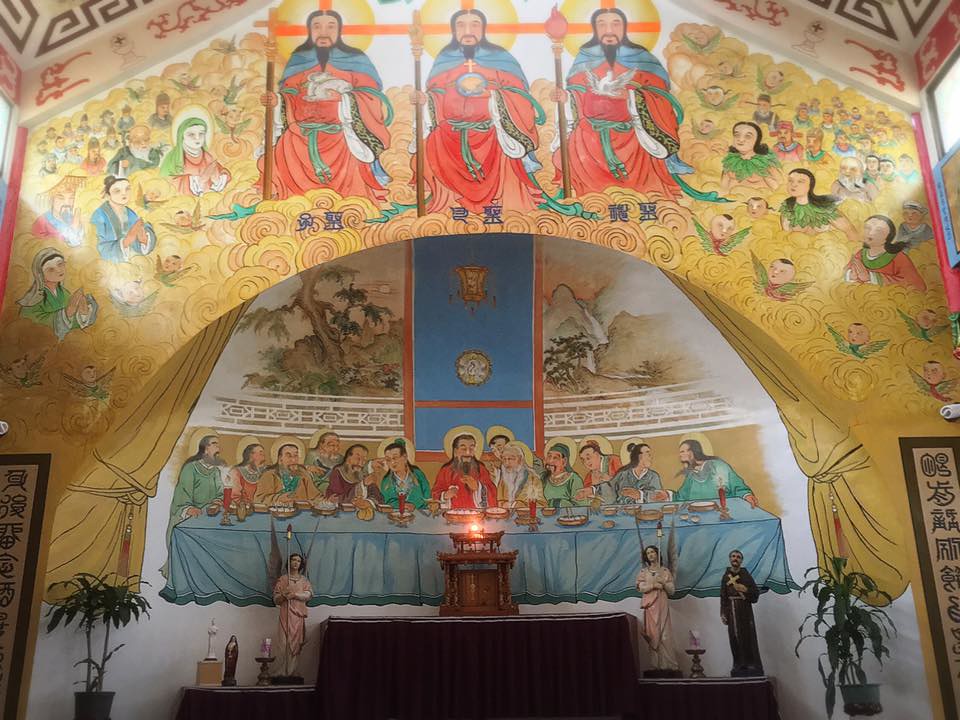 |
| Yes, this is the Last Supper except everyone is Chinese. |
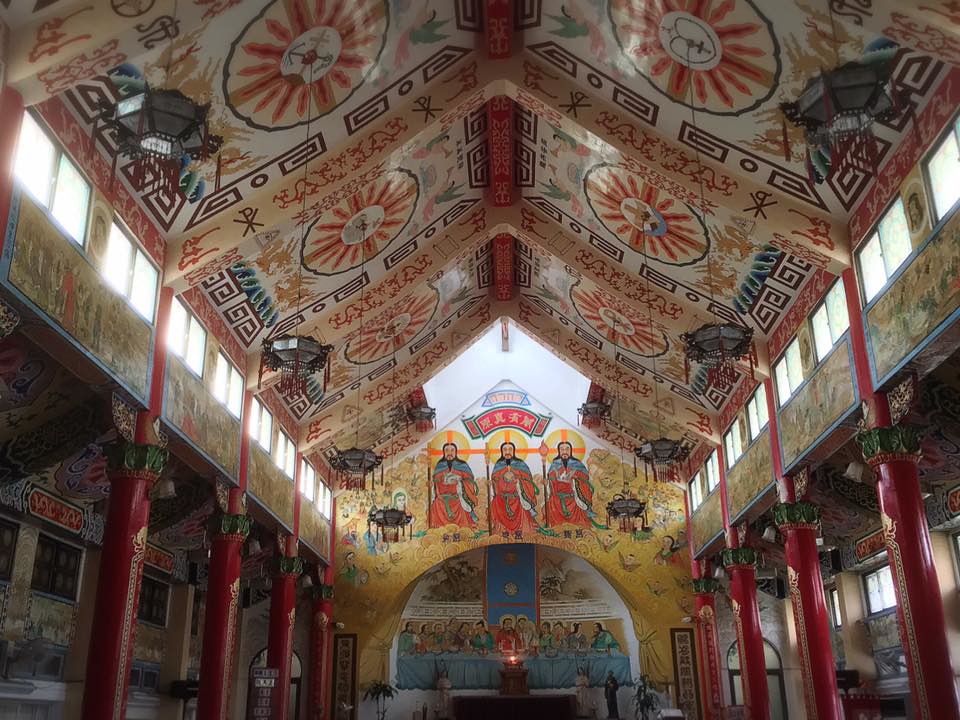
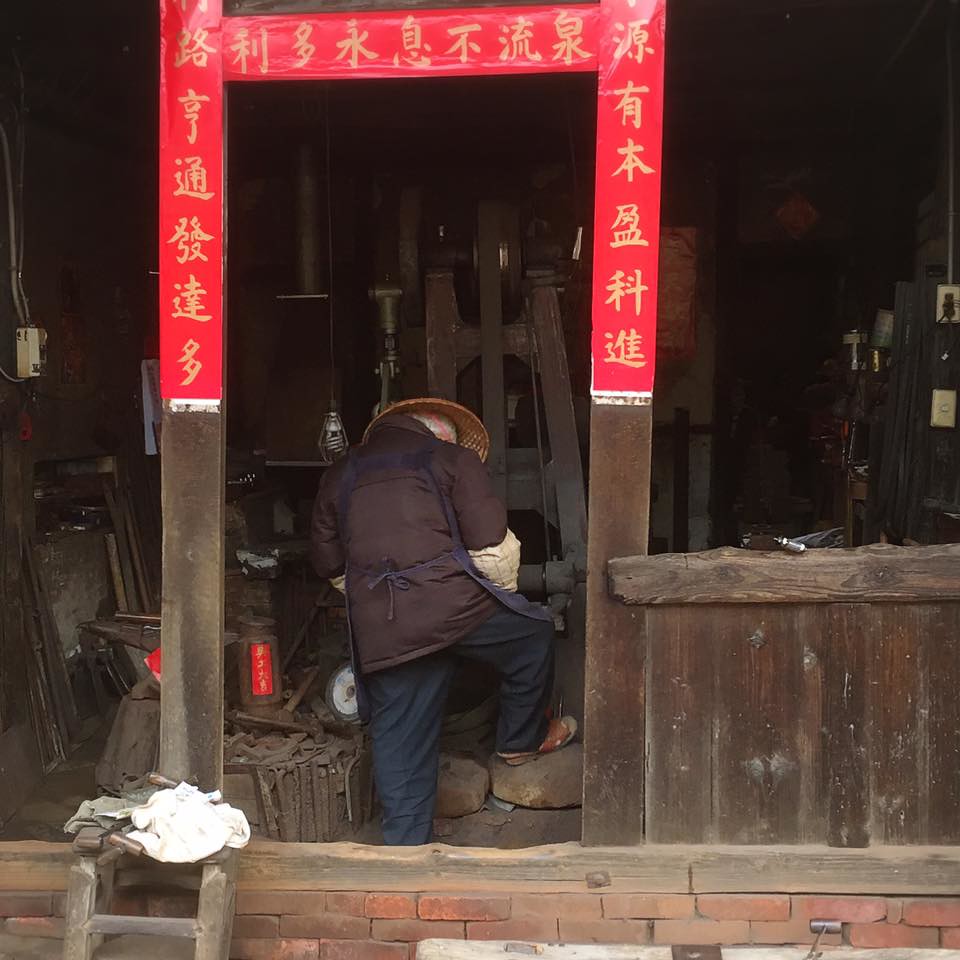
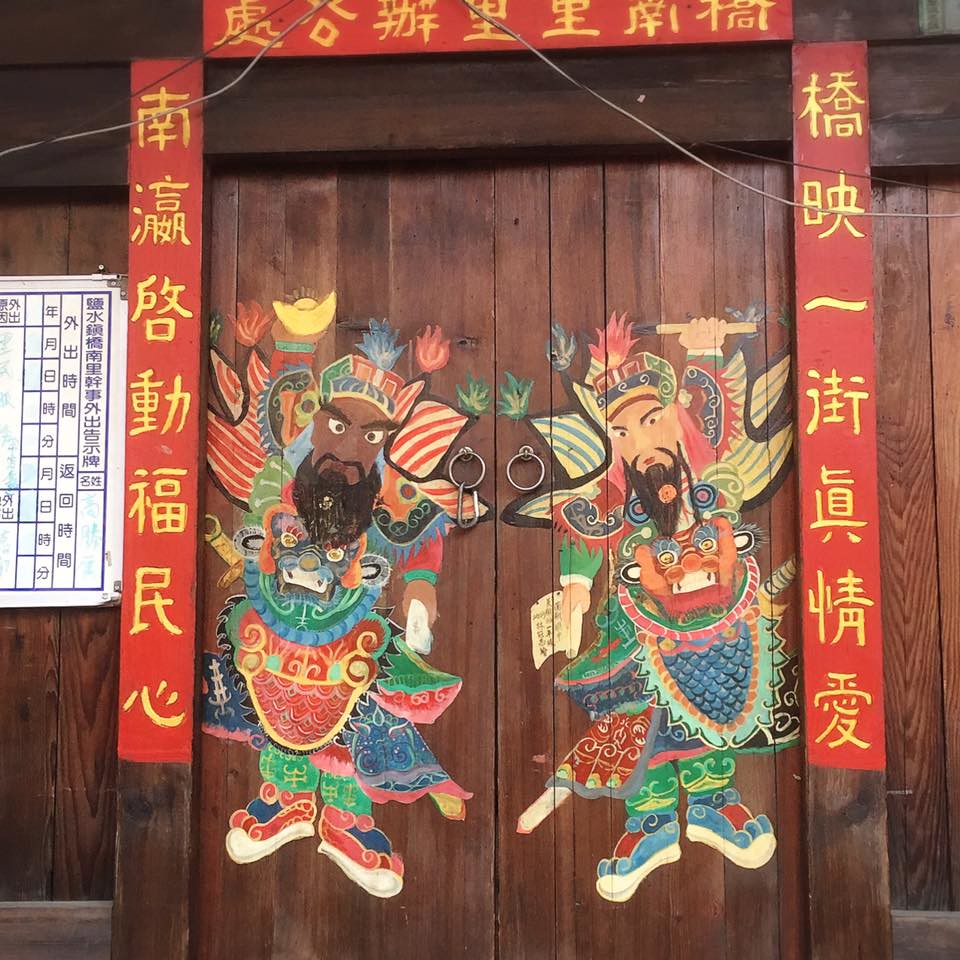
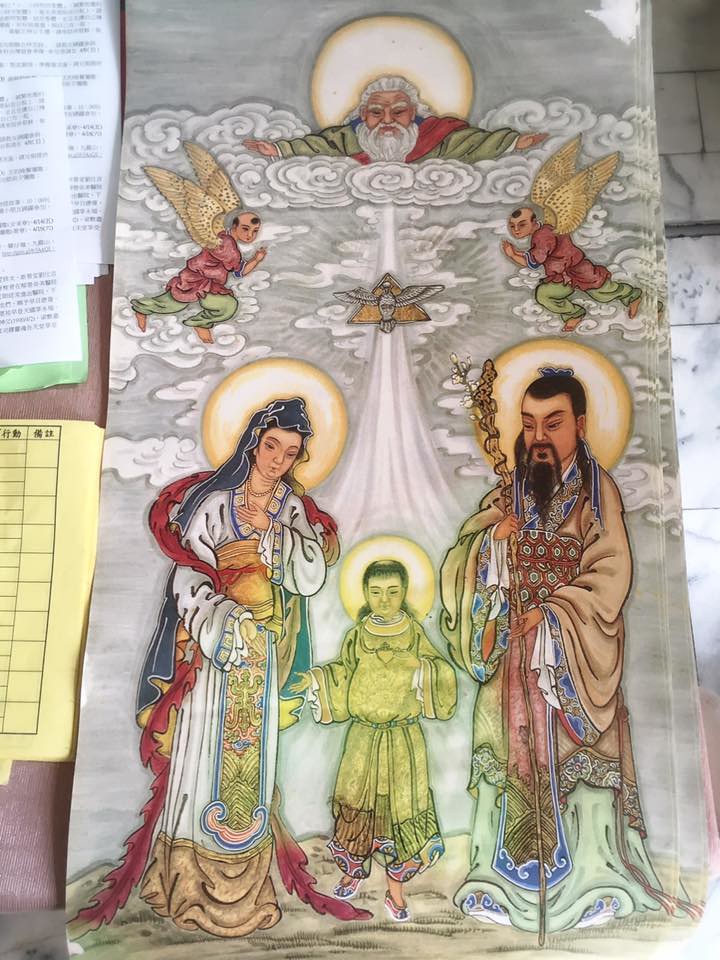 |
| Chinese Jesus, Mary and Joseph |
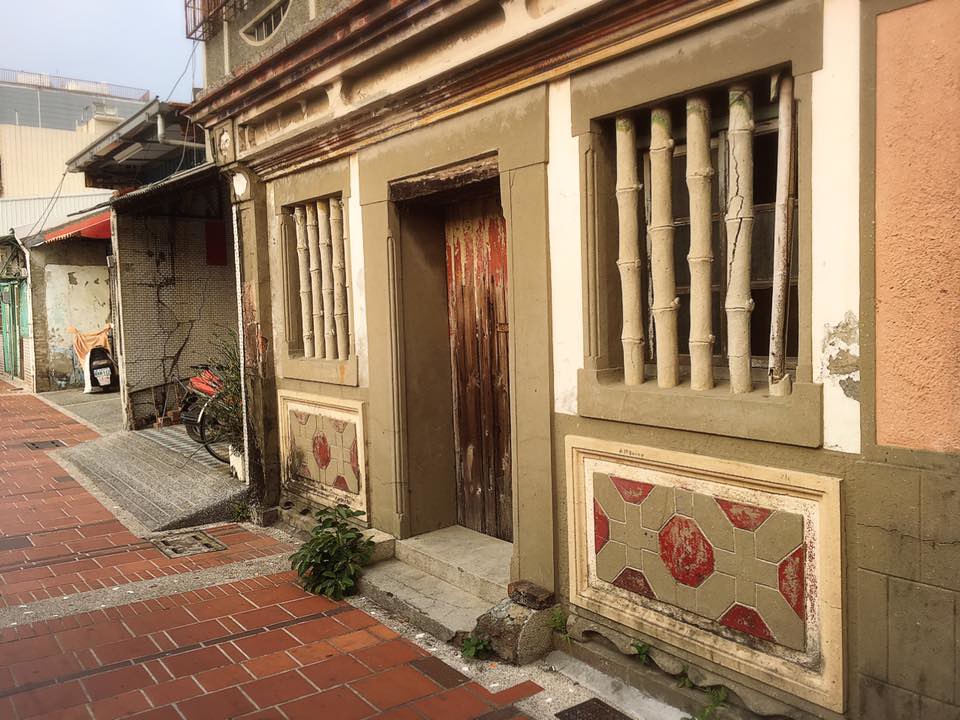 |
From modern cafes to old temples and traditional food in downtown Tainan to a war memorial for an incident that took place under Japanese rule in 1915 - and then high-end gelato - in Yujing, to old Chinese-style farmhouses in Jingliao and Japanese colonial architecture in Yanshui, I started to think it was silly to ask "who's land is this?" - it's very obviously the land of the people who live here.
I live here too, and while I won't yet be so arrogant as to claim it's also my land, I do love it nonetheless.

